|
CONTENTS Groups Designated Terrorist
Organizations • Governance of Police Powers Does Not
Protect Rights or Democratic Values - Steve Rutchinski and Pauline
Easton -
Canada and Lima Group Continue Unacceptable
Stand on
Venezuela
• Denounce Canada's Self-Serving Foreign
Policy -
Margaret Villamizar -
The Need for a New Direction for the
Economy • Media Talk Covers Up Need for Political
Action
by Worker Politicians - K.C. Adams -
• Actual Lack of Employment Versus
Officially
Recognized Unemployment -
Pierre Chénier -
Annual Davos Forum's
Latest Shenanigans
• World Economic Forum Calls for a "Great
Reset" •
The "Great Reset" of Imperialism
What to Expect from a
Biden Presidency
•
Inauguration of Joe Biden -- A Poem by Sacha
• Biden, Racial Justice and a Dream
Deferred •
Biden's Initial Actions and
People's Resistance -
Kathleen Chandler - •
Contending Authorities Contest
Biden's Call for Unity •
Food Insecurity in the United
States and the Need for a
New Direction for the Economy
Indian
Farmers
• Women Farmers Day Honours Their Role in
the Forefront
of the Indian Farmers' Fight for Rights
- Janice Murray -
• Farmers in Their Millions Valiantly
Continue Their Fight for
the Repeal of Neo-Liberal Farm Laws
- J. Singh and Meera Kaur -
• Canada's National Farmers Union Stands
with Indian Farmers - National Farmers Union -
• Why India's Farmers Are Protesting
- NFU
Backgrounder -
Groups
Designated Terrorist Organizations - Steve Rutchinski and Pauline Easton -
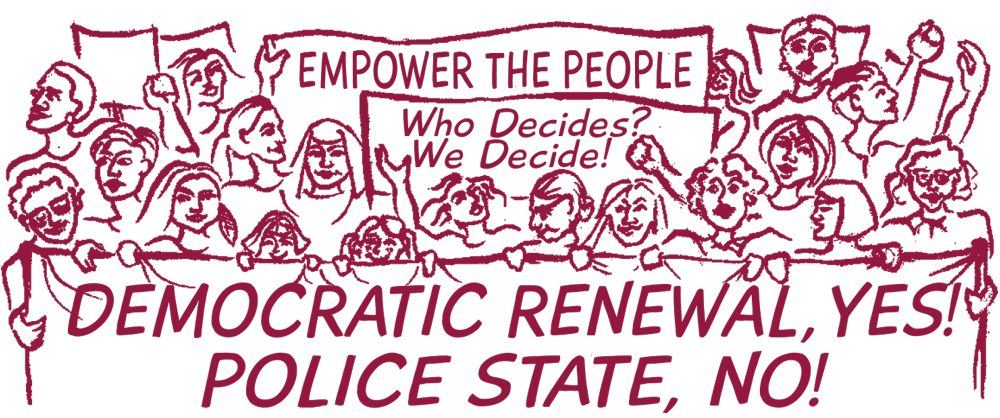
Canada's Public Safety Minister Bill Blair has announced that the Proud
Boys and 12 other groups are to be designated as "terrorist entities."
Such a decision is made, we are told, on the recommendation of Canadian
security and intelligence agencies after an "extremely rigorous" probe
has found "reasonable grounds to believe that an entity has knowingly
participated in or facilitated a terrorist activity."[1] What
criminal, terrorist activity the individual or group engaged in is not
disclosed. In fact, since 9/11 even what constitutes a terrorist act
has remained undefined. In the process the Government of Canada has
adopted, anyone named a "terrorist entity" has to plead their case in a
Star Chamber-type court which dispenses with due process.[2] Full disclosure
of the allegations made and who is making them are dispensed with "for
security reasons." It is a complete travesty of justice which
underscores that the exercise of police powers does not protect
anyone's rights, or democratic values, or society itself from the
danger of extremist terrorist violence or racist, homophobic and
misogynist acts.  Should
extremist, racist, homophobic, misogynist acts be prosecuted and
punished? Absolutely! But who is designating organizations "terrorist"
and by what process are they being outlawed? And on the basis of what
criteria? That is the issue, not whether they should be prosecuted if
they engage in criminal acts. It is beyond absurd to suggest that rule
of law is strengthened by use of police powers over which the people do
not exercise control. To suggest that the police powers which rule the
civil power have the consent of the governed is a travesty. It defies
logic and common sense. In Canada, the civil power is itself the
expression at any time and in various forms of racist, homophobic,
misogynist, anti-communist, anti-worker and terrorist values. Should
extremist, racist, homophobic, misogynist acts be prosecuted and
punished? Absolutely! But who is designating organizations "terrorist"
and by what process are they being outlawed? And on the basis of what
criteria? That is the issue, not whether they should be prosecuted if
they engage in criminal acts. It is beyond absurd to suggest that rule
of law is strengthened by use of police powers over which the people do
not exercise control. To suggest that the police powers which rule the
civil power have the consent of the governed is a travesty. It defies
logic and common sense. In Canada, the civil power is itself the
expression at any time and in various forms of racist, homophobic,
misogynist, anti-communist, anti-worker and terrorist values.
The FBI in the United States has decided that extremist
organizations are the new terrorists posing danger domestically. The
Five Eyes intelligence agencies, to which Canada belongs, seem to have
adopted that definition. The role these police powers are playing in
the polity reveals that what is called civil society is in fact
subordinate to the police powers, and governed by them. Rule of law is
the rule of these police powers, both the prerogative powers in the
hands of the head of state and cabinet, as well as the police and
intelligence agencies themselves and the "civilian review agencies" and
so-called democratic media which have become agents of disinformation.
What is referred to as rule of law is actually subordinate to
the police powers which routinely act behind closed doors in the name
of national interest and national security. Those who wield the police
powers tell the legislature what to do and the legislature and members
of the legislature, sworn to protect these police powers, rubber stamp
it. The irony is that -- as in the example of the FBI agent who is
president of Proud Boys in the U.S. -- Canadian experience confirms
that when a group with extremist views has engaged in terrorist acts,
it is incited by the police, who are leading those organizations or
have infiltrated them or, indeed, comprise them holus bolus.[3]  The Canadian
state and its "security and intelligence agencies" are responsible for
organizing and funding racist, white supremacist groups in Canada,
including in the 1970s and '80s the KKK cross burnings on the front
lawns of East Indians in BC in which the son of the Surrey Police Chief
was subsequently arrested, as well as the Heritage Front and other such
groups. The police agencies have either directly engaged in or
instigated individual acts of terrorist violence. The list of acts of
state violence, including fomenting hate and acts of violence against
migrant workers, people of colour and Indigenous peoples' legitimate
defence of their hereditary and treaty rights is endless! The Canadian
state and its "security and intelligence agencies" are responsible for
organizing and funding racist, white supremacist groups in Canada,
including in the 1970s and '80s the KKK cross burnings on the front
lawns of East Indians in BC in which the son of the Surrey Police Chief
was subsequently arrested, as well as the Heritage Front and other such
groups. The police agencies have either directly engaged in or
instigated individual acts of terrorist violence. The list of acts of
state violence, including fomenting hate and acts of violence against
migrant workers, people of colour and Indigenous peoples' legitimate
defence of their hereditary and treaty rights is endless!
This
long-established fact should not need to be stated. However, given the
way the cartel parties in Parliament are carrying on, each trying to
outdo the other saying that the Liberal government has not gone far
enough, it requires repeating. The decision to
designate the Proud Boys, in particular, and 12 others as terrorist
groups follows the report of the U.S. intelligence agencies. The
January 6 events in Washington, DC was to provide proof positive. But
then it became public knowledge that the leader and organizer of the
Proud Boys in the U.S. has been a "prolific police informant" working
for the FBI for years. Are we to believe that the police agencies
advising the government of Canada cannot put two and two together to
make four? Of course they can. And herein lies the problem the polity
faces! Taking again the example of current events
in the United States, U.S. law provides for harsh penalties for anyone
convicted of the kind of violence that occurred on January 6 in
Washington, DC, but those arrested have been charged with offences on
par with trespassing. They are freed on bail to return to their
everyday lives pending trial. One woman was granted permission to
vacation in Mexico because it was a pre-arranged trip! Oh that the
victims of police impunity in the U.S. and Canada were treated with
such kindness! Despite the facts and experience of
the Canadian people, what we see and hear from the cartel parties in
Canada and the U.S. is that more police powers are needed to stamp out
the culture and organization of extremist violence, which they
themselves are responsible for perpetrating both at home and abroad. It
is brutal disinformation of the public while expanding police powers.
 All of it is used
to make sure no discussion takes place within the polity on what it
means to defend freedom of speech and conscience while not permitting
acts of violence against the people. The cartel parties which are
crowing that they are the champions of rights should be seriously put
in their place. Which people of colour in Canada, Indigenous persons,
or persons of various faiths can say they feel safer when under "police
protection?" Victims of hate and terrorist acts are supposed to accept
a "trade-off" between security and rights. It is irrational. All of it is used
to make sure no discussion takes place within the polity on what it
means to defend freedom of speech and conscience while not permitting
acts of violence against the people. The cartel parties which are
crowing that they are the champions of rights should be seriously put
in their place. Which people of colour in Canada, Indigenous persons,
or persons of various faiths can say they feel safer when under "police
protection?" Victims of hate and terrorist acts are supposed to accept
a "trade-off" between security and rights. It is irrational.
How
to deal with the police powers in Canada, including their incitement of
extremist, racist, homophobic and misogynist acts is a serious matter
facing the polity. To have these matters relegated to behind the scenes
processes carried out in the name of national security, while keeping
the mass of the people -- the polity itself -- in the dark as to
criteria and depriving them of information is not the way to go. The
obscene haste with which Canada is acting to outdo the U.S. by
declaring the Proud Boys a terrorist group, which would not exist
without the support of the police forces in the United States and the
presidential powers themselves, does not prove that Canada is a law
abiding safe country. It merely shows that the liberal democratic
institutions are in serious trouble, laying the grounds for public
opinion to be impotent in the face of actions the police
powers deem fit to take in the name of national interest and national
security. It has always been the modus operandi of
the liberal institutions to legalize a course of action by initiating
it against Nazis or right-wing extremists, then in fact
letting them off the hook, but targeting the people's legitimate
resistance fighters. The state and its agencies, including the cartel
political parties, are determined to keep the decision-making power in
their hands in the name of all sorts of high ideals, to keep the people
without a voice or any means of expression. It is not just the Proud
Boys the ruling class is making illegal. Besides the 12 others it has
designated to be a danger, the state regularly targets unions, workers'
collectives and Indigenous peoples. Spokespersons of the cartel
parties, such as Justin Trudeau and his Ministers, take every
opportunity to extend this practice to small political parties as well
which are branded as fringe, extremist and so forth. Beware
of measures the Government and cartel parties are taking and advocating
in the name of national security and defending rights. The verdict
coming out of the Second World War was indeed that racists and fascists
have no right to speak. But this was never applied by the
Anglo-American powers that called themselves democratic. On the
contrary, they launched the Cold War to protect "the English-speaking
peoples" and their values and way of life and no crime was too great
for them, all in the name of the high ideals of democracy, liberty and
peace. Today it is only by affirming the people's
right to conscience and expression and making sure they can participate
in making the decisions which affect their lives that the well-being of
the polity can be secured. We are on the eve of the
30th anniversary of the demand for justice of the families of missing
and murdered Indigenous women and girls. Where is the prosecution of
those who have committed racist, misogynist and terrorist crimes
against them, beginning with those entrusted to defend them -- from the
top echelons of power to the lowliest police officer trained by them to
emulate their spirit and "values"?
Where are police held to account for targeting people of colour, youth,
the homeless, and Indigenous peoples, especially women and girls?
So long as self-serving criteria define what is a crime and
what constitutes terrorism, and who decides is kept in the hands of the
police powers themselves, there will be no accountability of any kind.
Shame on the cartel parties which claim to champion minority
rights! Notes 1. The 13 new groups
added to the Criminal Code list of terrorist
entities include four that fall into the category of what the
government calls "ideologically motivated violent extremist groups"
(Atomwaffen Division, the Base, Russian Imperial Movement and Proud
Boys). The government describes the other organizations added as "Al
Qaida affiliates" (Jama'at Nusrat Al-Islam Wal-Muslimin, Front de
Libération du Macina, and Ansar Dine), and "Daesh
affiliates" (Islamic State West Africa Province, Islamic State in the
Greater Sahara, Islamic State in Libya, Islamic State East Asia, and
Islamic State -- Bangladesh), as well as "Hizbul Mujahideen."
The announcement came right after the House of
Commons unanimously adopted a motion put forward by the NDP on January
25 which reads: "That
the House call upon the government to use all available tools to
address the proliferation of white supremacist and hate groups,
starting with immediately designating the Proud Boys as a terrorist
entity." The statement
issued by Public Safety Canada announcing the addition of the groups to
the list of terrorist entities says, in part: "Canadians
expect their government to take all necessary steps to keep them safe,
while safeguarding their values, their rights and freedoms and the
open, inclusive character of our country. The Criminal Code
listing regime is an important tool for countering terrorism in Canada
and globally, and is part of that commitment." Bill
Blair, Minister of Public Safety and Emergency Preparedness said:
"Violent acts of terrorism have no place in Canadian society or abroad.
Today's additions to the Criminal Code list of
terrorist entities are an important step in our effort to combat
violent extremism in all forms. Canadians expect their Government to
keep them safe and to keep pace with evolving threats and global
trends, such as the growing threat of ideologically motivated violent
extremism. The Government of Canada will continue to take appropriate
actions to counter terrorist threats to Canada, its citizens and its
interests around the world." According
to the Canadian Security Intelligence Service (CSIS):
"Ideologically motivated violent extremism (IMVE)
is often driven by a range of grievances and ideas from across the
traditional ideological spectrum. The resulting worldview consists of a
personalized narrative which centres on an extremist's willingness to
incite, enable and or mobilize to violence. Extremists draw inspiration
from a variety of sources including books, images, lectures, music,
online discussions, videos and conversations. Given the diverse
combination of motivations and personalized worldviews of recent
mass-casualty attackers, the use of such terms as 'right-wing' and
'left-wing' is not only subjective, but inaccurate in describing the
complexity of motivations of IMVE attacks in Canada and abroad."
At the press conference when the announcement was
made, Blair said: "No
matter the ideological motivation, they're all hateful, intolerant and,
as we've seen, they can be highly dangerous." He said he hopes
expanding the terrorist list will send a message to groups intent on
sowing division and hate and causing harm, that their actions will not
be tolerated by law enforcement, CBC reported. "Their
violent actions and rhetoric are fuelled by white supremacy,
anti-Semitism, racism, homophobia, Islamophobia and misogyny, and
unfortunately, often in combination of all of the above. On several
different occasions we have seen the tragic results that this type of
extremism can bring to Canadian soil," Blair said referencing the 2017
Quebec City mosque attack and the 2018 Toronto van attack.
As required, the listing of the 13 groups was
published in the Canada Gazette: "Whereas, the
Administrator in Council, on the recommendation of the Minister of
Public Safety and Emergency Preparedness, is satisfied that there are
reasonable grounds to believe that each entity listed in the annexed
Regulations Amending the Regulations Establishing a List of Entities
has knowingly carried out, attempted to carry out, participated in or
facilitated a terrorist activity or has knowingly acted on behalf of,
at the direction of or in association with such an entity; Therefore,
His Excellency the Administrator of the Government of Canada in
Council, on the recommendation of the Minister of Public Safety and
Emergency Preparedness, pursuant to subsection 83.05(1) of the Criminal Code makes
the annexed Regulations Amending the Regulations Establishing a List of
Entities." The
"Administrator in Council" is Richard Wagner, Chief Justice of the
Supreme Court of Canada, who currently serves as the statutorily
determined replacement for former Governor General Payette.
The announcement in the Gazette serves
notice that the property of those listed "can be the subject of
seizure/restraint and/or forfeiture. In addition, institutions, such as
banks and brokerages, are subject to reporting requirements with
respect to an entity's property and must not allow those entities to
access the property nor may these institutions deal with or otherwise
dispose of the property." The notice in the Gazette also states
that a "listed entity is included in the definition of terrorist group
in the Criminal Code
so offences applicable to terrorist groups apply to these entities.
However, unlike terrorist groups that are not listed, a prosecution
related to a listed entity does not require the Crown to demonstrate
that the entity has, as one of its purposes or activities, facilitated
or carried out a terrorist activity." Further, it states that "the
listing of terrorist entities facilitates the prosecution of
perpetrators and supporters of terrorism." Currently
there are 73 groups designated as terrorist entities. Interestingly
enough, the KKK and extremist Ukrainian groups like Azov Battalion and
others are not. The full list is available here.
2. The
Star Chamber was an English court which sat from the late 15th century
to the mid-17th century to prosecute those deemed to be the King's
enemies. Created by King Henry VII in 1487, it was named for a room
with stars painted on the ceiling in the royal palace of Westminster
where the court sat. The Star Chamber was an instrument of the monarch
and consisted of royal councillors and two royal judges. The court
dispensed with "due process" as it was then understood.
3. One
of the first
public activities of Proud Boys in Canada took place July 1, 2017 when
members of the Canadian Armed Forces self-identifying as Proud Boys
disrupted a ceremony organized by Indigenous activists in Halifax to
mourn atrocities committed against Indigenous peoples. It was held
around the statue of Edward Cornwallis, the first Lieutenant Governor
of Nova Scotia, known for his violent actions against the Indigenous
peoples. 
Canada
and Lima Group Continue Unacceptable Stand on Venezuela -
Margaret Villamizar - 
January 27, 2020.
Protest in Ottawa against visit by imposter Juan Guaidó.
As deputies of the new Venezuelan National Assembly were being
sworn in on January 5, the imposter, self-proclaimed "interim
president" Juan Guaidó, gathered a motley crew from remnants
of the former National Assembly, whose term expired that day, to
declare that the term of that defunct body, along with his fictitious
presidency, were extended for another year. This
latest stunt was directed by the U.S., and supported by Canada and some
others. They had declared long in advance that they would not recognize
the newly-elected parliament, but would continue recognizing the
outgoing National Assembly as the only "legitimate" democratic
institution in the country even after its term was up. In that way,
they hope to prolong the farce of a parallel government with no power,
that lacks support inside the country and exists mainly on social
media. Time and again they have staged stunts in the belief
that each would bring the Maduro government down. Time and again this
has not happened. It seems that now they think another year will do the
trick. The same day, a diminished Lima
Group issued a statement
exhorting whoever pays attention to it anymore, to "join in the
disregard and rejection of this illegitimate National Assembly."
It stopped short of taking the position advocated by the U.S. and
Canada of supporting the outgoing legislature after its term expires
and recognizing the "presidency" of Juan Guaidó.
Just one day before, then-Foreign Minister François-Philippe
Champagne wrote in his department’s Twitter
account: "As the Dec 6 elections were neither free nor fair,
Canada will
continue to recognize the National Assembly, democratically elected in
2015, as #Venezuela's legitimate legislature and its president as
Venezuela's Interim President." 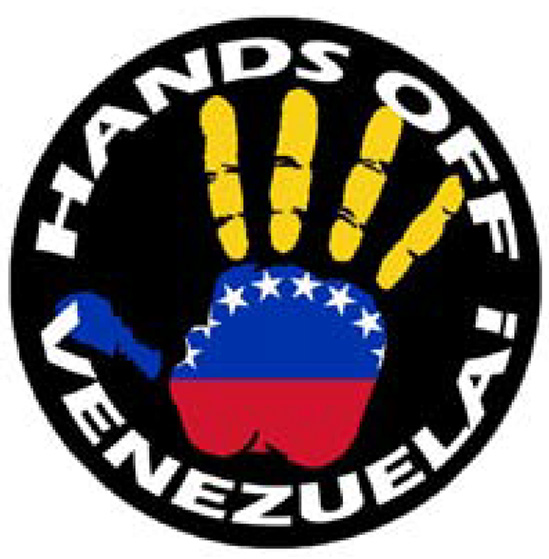 The U.S. had
tried, but failed as well, to get the Organization of American States
(OAS) to adopt this position at a special meeting of the organization
held in December right after the new National Assembly was elected.
With Canada's help, the U.S. was able to corral enough countries to get
an interfering resolution passed that called on the international
community to "join in the rejection of these fraudulent elections" and
demanded the holding of new legislative and presidential elections as
soon as possible. But it did not call for continuing to recognize the
outgoing National Assembly instead of the newly elected one, and had no
mention of recognizing Guaidó as interim president. The U.S. had
tried, but failed as well, to get the Organization of American States
(OAS) to adopt this position at a special meeting of the organization
held in December right after the new National Assembly was elected.
With Canada's help, the U.S. was able to corral enough countries to get
an interfering resolution passed that called on the international
community to "join in the rejection of these fraudulent elections" and
demanded the holding of new legislative and presidential elections as
soon as possible. But it did not call for continuing to recognize the
outgoing National Assembly instead of the newly elected one, and had no
mention of recognizing Guaidó as interim president.
It did not take long for the social media monopolies to be
mobilized to
up their efforts on behalf of the regime change cause. Twitter has
suspended the account of the new National Assembly. Now a fake one
controlled by Guaidó's coup forces posing as the "official
account of
the National Assembly of Venezuela," is all that appears in an online
search. Did those who cheered when Twitter censored Trump by shutting
down his account, not realize how that private company's power would be
and is being used to censor many others targeted by the imperialist
ruling elite?
Meanwhile, sanctions against
Venezuela are killing the people of that country, something Canada
never speaks about. Sanctions are an act of war in which Canada is
engaging without having to declare war or sacrifice a single soldier.
No matter what one thinks of the government of Venezuela, it is up to
the Venezuelan people to settle their own scores and the U.S. and
Canada interfering in their affairs in the name of freedom and
democracy is unacceptable.
The
actions of the Trudeau government are beyond shameful. And just as
shameful, no opposition party has seen fit to denounce what the
government has been up to -- participating in a brutal economic war
against Venezuelans and telling them who they can and cannot elect to
govern them, preventing Venezuelans resident in Canada from voting in
the 2018 presidential election (the only country to do so), and
recognizing an illegal parallel government and its so-called ambassador
in Canada, plucked from the putrid swamp of Miami's anti-Cuba mafia, as
the "legitimate" representatives of the Venezuelan people.
In addition, Canada is now refusing to renew the visas of or
accept any diplomatic personnel designated by the Bolivarian Government
of Venezuela, thereby depriving more than 20,000 Venezuelan-Canadians
and immigrants from that country of consular services. Should it permit
the Embassy of Venezuela to be occupied by the pretend government, it
would be a violation of the Vienna Convention governing diplomatic
affairs. Such an embassy could not even function since it controls no
government services whatsoever. None of the cartel
parties can claim to be acting for Canadians who have never given their
consent for any of this. The position of the Communist Party of Canada
(Marxist-Leninist) is well known. It calls on Canadians to insist that
the Government of Canada cease all involvement in these illegitimate
activities and completely disassociate itself from the U.S.
regime-change project. The Biden presidency has made it clear it will
continue to push for regime change by having more effectively targeted
sanctions, according to the new Secretary of State Anthony Blinken.
It is to the credit of the Venezuelan people and their
government that they have stood firm, steadfastly resisting plot after
plot to incite a bloody civil war and smash their civil-military union
so that foreign and domestic interests can seize control of their
country and do away with their Bolivarian nation-building project,
under the hoax of "restoring democracy." Their resolve and the fact
that justice is on their side has also won them the support of
democratic and anti-imperialist forces the world over, including in
Canada and Quebec. While the Canadian government
has cast its lot with an illegitimate and illegal imperialist plot
against the Venezuelan people, it is the Canadian people who are
upholding the rule of law, democratic principles and human rights by
speaking in their own name and organizing actions to say Hands off Venezuela! Respect
Venezuela's Sovereignty! Let the Venezuelan People Decide!

The Need
for a New Direction for the Economy
- K.C. Adams -  Talk
about a looming economic crisis as a result of massive deficit
spending, unemployment and underemployment and how the pandemic is
being dealt with goes round and round. Most of it is descriptive or a
matter of opinions about how more should be done in this or that
direction but the reference points are generally directed at getting
working people to accept the current disastrous direction of the
economy. It is directed at depriving working people of an outlook of
their own which permits them to organize an alternative self-sufficient
economy which puts the human factor/social consciousness at the centre
of its endeavours. Demobilizing the working class and ensuring working
people are blocked from taking actions with analysis in their own
interest is a full-time preoccupation of the cartel parties and
spokespersons of the narrow private interests which dominate both the
economy and the political system. It is the working class together with
all concerned, that are interested in solving problems in a manner that
provides a new direction for the economy and politics that serves the
people and not the global oligarchs and their outmoded aim for maximum
private profit. Workers need to put forward politicians from their own
ranks who actually speak in their own name, not in the name of a system
of cartel party government whose main aim is to keep the people away
from the decision-making power. Talk
about a looming economic crisis as a result of massive deficit
spending, unemployment and underemployment and how the pandemic is
being dealt with goes round and round. Most of it is descriptive or a
matter of opinions about how more should be done in this or that
direction but the reference points are generally directed at getting
working people to accept the current disastrous direction of the
economy. It is directed at depriving working people of an outlook of
their own which permits them to organize an alternative self-sufficient
economy which puts the human factor/social consciousness at the centre
of its endeavours. Demobilizing the working class and ensuring working
people are blocked from taking actions with analysis in their own
interest is a full-time preoccupation of the cartel parties and
spokespersons of the narrow private interests which dominate both the
economy and the political system. It is the working class together with
all concerned, that are interested in solving problems in a manner that
provides a new direction for the economy and politics that serves the
people and not the global oligarchs and their outmoded aim for maximum
private profit. Workers need to put forward politicians from their own
ranks who actually speak in their own name, not in the name of a system
of cartel party government whose main aim is to keep the people away
from the decision-making power.
The
December Statistics Canada report on the large number of
unemployed and underemployed workers and drop in workforce
participation rate is an example of talk that goes round and round.
(The January report has now been issued.) Following
its release economist Armine Yalnizyan told The Hill
Times that she expects job numbers, as
well as the workforce participation rate, to continue to
decline. Yalnizyan said she has been keeping a close eye on
participation rates in the labour force. "In the United States, we've
had a cautionary tale that four times as many women as men have been
dropping out of the labour market entirely. There can be all sorts of
reasons for that, but the biggest reason has been other unpaid work
demands, primarily caring for children who need to be homeschooled
because of remote learning due to unsafe conditions or lack of child
care. We are seeing that in Canada," Yalnizyan said. She added
that the drop in workforce participation has implications for
the economy. "If fewer people are earning money, they have less to
spend, and if they have less to spend, the recovery is being dragged.
It doesn't matter how early you try and open things up to bring things
back to normal -- if women are not getting back in, and are dropping
out, you have a bigger problem on your hands," she said. However,
the issue goes beyond "having less to spend." The drop in the workforce
participation rate plus the large number of unemployed and
underemployed mean a loss of potential social value for the country.
The workers not working in the socialized economy are not producing
social wealth. As Workers' Forum pointed out in its
February 2 issue:  "The refusal of
the ruling elite to organize universal free childcare and early
learning for all children is a block to the economy meeting its
potential. "The refusal of
the ruling elite to organize universal free childcare and early
learning for all children is a block to the economy meeting its
potential.
"The refusal to challenge monopoly right
and its expropriation of the added-value workers produce drains needed
social value from the economy and country that could be used for
increased investments in social programs and public services.
"The refusal to challenge monopoly right to realize (pay for)
the social value they consume from educated and healthy workers as
social reproduced-value but instead allow the oligarchy to expropriate
it as private profit deprives public education, health care and other
social programs of the funds they require to meet and guarantee the
needs and rights of Canadians." Leah Nord, the
senior director of workforce strategies at the Canadian Chamber of
Commerce said, in a press release concerning the December report,
"We're not through the storm. We're not going to be able to weather
this storm -- these second waves [of COVID-19] are going to affect
labour markets, among other things. Within that darkness lies a concern
over December's dropping labour force participation rates, mostly
comprised of male youth and working women, likely frustrated by the job
search and staying home to take care of suddenly homebound children,
respectively. The enduring impacts of the increasingly long-term
unemployed and workforce drop-outs will cast a long shadow upon the
recovery, as re-entry into what will assuredly be a very different
labour market presents significant obstacles." "Nobody
has a crystal ball -- we have a lot of great data out there -- but we
are really going to have to cull this labour market by sectors, but
also by communities," Nord added ominously. Earlier
this year, Bank of Montreal chief economist Doug Porter told The
Hill Times that the current decline in workforce
participation and employment "wasn't any surprise for us," and that his
concerns "predated Statistics Canada's December report." He said, "We
saw a lot of smaller retailers in Toronto have had to close their
doors, so naturally we're going to have job losses." 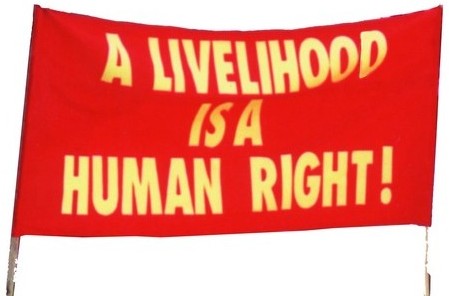 "The worry is,
since then we've had wider shutdowns in Ontario and more shutdowns in
other provinces, and I think we'd be extremely lucky if we don't see an
even bigger decline a month from now," Porter said. "I think we all
have to realize that there is a very heavy price to be paid in terms of
people's livelihoods when we start calling for big new restrictions on
businesses... There is a trade-off here -- we [the banks] get accused
of putting profits ahead of people, and I don't see it that way. I
think it's livelihoods and not profits, but I see it day-by-day, calls
for even more intense restrictions, and I wonder if it's really
achieving what people think it's achieving. It's definitely coming at
an economic cost," Porter said. "The worry is,
since then we've had wider shutdowns in Ontario and more shutdowns in
other provinces, and I think we'd be extremely lucky if we don't see an
even bigger decline a month from now," Porter said. "I think we all
have to realize that there is a very heavy price to be paid in terms of
people's livelihoods when we start calling for big new restrictions on
businesses... There is a trade-off here -- we [the banks] get accused
of putting profits ahead of people, and I don't see it that way. I
think it's livelihoods and not profits, but I see it day-by-day, calls
for even more intense restrictions, and I wonder if it's really
achieving what people think it's achieving. It's definitely coming at
an economic cost," Porter said.
NDP Member of
Parliament and finance critic Peter Julian was quoted in The
Hill Times as saying the StatCan December labour force survey
reveals "devastating numbers, but I'm not surprised." Julian said,
"Going into the pandemic, Canadian families already were at the highest
level of debt in the industrialized world, so we've seen a real
deterioration in our standard of living, with Canadians struggling to
make ends meet. The devastating impacts of the pandemic have magnified
that -- we're seeing people that are unable to put food on the table,
people who are unable to keep a roof over their head... So when you see
the employment numbers and then see the devastating financial and
economic impacts that existed prior to COVID, you can see that there is
an economic crisis that is brewing and that is very profound...
Billionaires have increased their wealth by over $50 billion [during
the twin crises]. We're seeing record levels of profits in the banking
industry despite [the sector] getting [billions] in supports, [and the
banks] have done very little to address the needs of small businesses
or people, [so] what we have is a perfect storm where regular families
are being absolutely hammered financially, and the wealthiest are
getting away with massive profiteering." 
- Pierre Chénier -
Statistics Canada defines its Labour Force Survey as "a
monthly survey which measures the current state of the Canadian labour
market and is used, among other things, to calculate the national,
provincial, territorial and regional employment and unemployment rates.
The survey results are used to make important decisions regarding job
creation, education and training, retirement pensions and income
support. At this time, as Canadians continue to deal with the COVID-19
pandemic, it is more important than ever to have an accurate picture of
the job situation, the cost of living, and the economy. Data will be
used to guide government decisions and assist Canadians through these
challenging times." 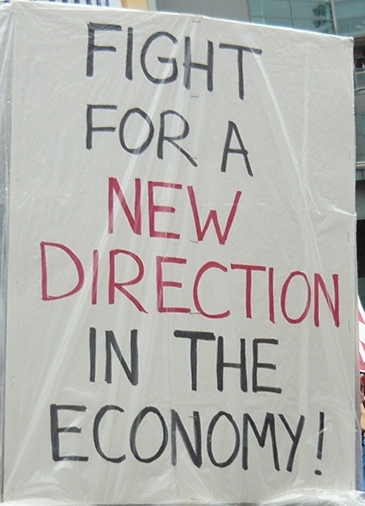 Statistics Canada
states: "The concepts of employment and unemployment are derived from
the theory of the supply of labour as a factor of production. The
production referred to is in turn defined as those goods and services
included in the System of National Accounts." Statistics Canada
states: "The concepts of employment and unemployment are derived from
the theory of the supply of labour as a factor of production. The
production referred to is in turn defined as those goods and services
included in the System of National Accounts."
"While
the logical and precise unit of measurement of total labour supply is
person-hours, the conceptual terms of reference for the survey require
that individual members of the population be classified as employed,
unemployed, or not in the labour force. Accordingly, persons who are
supplying services in the reference period, regardless of the quantity
supplied, are classified as employed while those who provide evidence
that they are offering their labour services to the market (again
regardless of quantity) are classified as unemployed. The remainder of
the population, those neither currently supplying nor offering their
labour services, are referred to as persons not in the labour force.
"The definition of unemployment is therefore the following:
"Unemployed persons are those who, during reference
week: - were on temporary layoff during
the reference week with an expectation of recall and were available for
work, or - were without work, had looked
for work in the past four weeks, and were available for work, or
- had a new job to start within four weeks from reference
week, and were available for work." Therefore,
those who are without a job but are not considered to be offering their
labour services to the market are not classified as unemployed and
therefore are not classified as being a part of the labour force either.
Based on those definitions, Statistics Canada reaches these
figures for January 2021 (in thousands, except for rates): Canada' s population: 31,191.2
Labour force: 20,171.0
Employment: 18,272.0
Full-time employment: 15,132.3
Part-time employment: 3,139.7
Unemployment: 1,899.0
Participation rate: 64.7 per cent
Unemployment rate: 9.4 per cent
Employment rate: 58.6 per cent
For reference, in April 2020, when the country was under
severe lockdowns because of the COVID-19 pandemic, the figures were:
Population: 31,094.7
Labour force: 18,603.2
Employment: 16,184.9
Full-time employment: 13,662.8
Part-time employment: 2,522.0
Unemployment: 2,418.3
Participation rate: 59.8 per cent
Unemployment rate: 13.0 per cent
Employment rate: 52.1 per
cent For January 2021, Statistics Canada makes
observations from the figures among which are the following: -
Employment fell to lowest level since August. -
Employment fell by 213,000 (-1.2%) in January. Losses were entirely in
part-time work and were concentrated in the Quebec and Ontario retail
trade sectors. - The decline in January followed a
53,000 drop (-0.3%) in December and brought employment to its lowest
level since August 2020. - Compared with February
2020, employment was down 858,000 in January and COVID-related absences
from work were up 529,000. - The unemployment rate
rose 0.6 percentage points to 9.4 per cent, the highest rate since
August 2020. - The number of long-term unemployed
(people who have been looking for work or who have been on temporary
layoff for 27 weeks or more) remained at a record high (512,000).
- Employment declined in January in three services-producing
industries most affected by new and continuing public health
restrictions -- accommodation and food services (-8.2%), retail trade
(-7.4%), and information, culture and recreation (-2.4%). -
Employment in construction rose by 39,000, manufacturing lost 12,000
jobs, while, as a whole, the goods-producing sector gained 23,000 jobs.
- Employment among youth aged 15 to 24 declined by 108,000
(-4.6%) in January, falling to its lowest level since August 2020.
Employment for female youth fell by 69,000 (-6.1%) and was farther
(-17.4%) from its pre-COVID-19 February 2020 level than any other major
demographic group. Male youth employment fell by 39,000 (-3.3%) and was
11.6 per cent lower than it was in February 2020. Statistics
Canada attributes the overall loss of employment to extended public
health measures taken by a number of provinces in December 2020 in
response to increasing COVID-19 cases. While these
statistics indicate definite trends, they do not accurately indicate
the number of people who are unemployed, or the unemployment rate,
because according to the criteria quoted above, actually offering one's
services to the labour market determines if one is considered
unemployed. It has been known for a long time that
all those workers who find themselves without a job and are not
actively looking for one (offering their services to the labour market)
during the time the labour survey is done are not considered unemployed
or part of the labour force. This means that at all times, even at the
best of times in terms of the performance of the labour market, the
actual rate of unemployment is much higher than the official rate.
Aside from this, the full extent of the large increase in
unemployment because of massive layoffs during the pandemic is far from
being reflected in the unemployment figures. In
April 2020, with the massive surge of unemployment due to severe
COVID-19 lockdowns across the country, Statistics Canada wrote:
"Large increase in unemployment "The
unemployment rate rose 5.2 percentage points in April to 13.0 per cent.
This followed an increase of 2.2 percentage points in March. Over the
period since comparable data became available in 1976, the April
unemployment rate was second only to the 13.1 per cent observed in
December 1982. "The April unemployment
rate would be 17.8 per cent, when adjusted to reflect those who were
not counted as unemployed for reasons specific to the COVID-19 economic
shutdown. During the week of April 12, 1.1 million people
were not in the labour force but had worked recently (in March or
April) and wanted to work. They were not counted as
unemployed but were counted as not in the labour force because they did
not look for work, presumably due to ongoing business closures and very
limited opportunities to find new work." (Emphasis
added.) The assessment of a rate of
unemployment of 9.4 per cent in January 2021 is clearly far below the
actual rate. If one uses the same methodology, using the discrepancy
that was recognized by Statistics Canada in April 2020, the January
rate would be around 12.8 per cent. That is without counting all those
workers who, during the period in which the survey was done, did not
actually look for work for reasons other than COVID-19.  Historically, one
of the aims of the assessment of unemployment based on participation in
the labour market has been to ensure that Employment Insurance
(formerly Unemployment Insurance) is not a social program that protects
all those who find themselves unemployed in an economic system in which
everything is subordinated to narrow private interests. A lower
official rate of unemployment means that workers have to work more
hours before becoming eligible and the duration of their benefits is
shorter. This along with all the other criteria for eligibility adopted
over the years which have led to a situation in which it is assessed
that only about 40 per cent of the unemployed receive EI benefits. An
exception made by the federal government since the end of September
2020, which will last until September 11 this year, assumes a minimum
unemployment rate of 13.1 per cent is being applied in all EI economic
regions across Canada. This was not done to provide justice to the
unemployed but to maintain a certain amount of money in circulation in
the economy so as to prevent further economic collapse. Historically, one
of the aims of the assessment of unemployment based on participation in
the labour market has been to ensure that Employment Insurance
(formerly Unemployment Insurance) is not a social program that protects
all those who find themselves unemployed in an economic system in which
everything is subordinated to narrow private interests. A lower
official rate of unemployment means that workers have to work more
hours before becoming eligible and the duration of their benefits is
shorter. This along with all the other criteria for eligibility adopted
over the years which have led to a situation in which it is assessed
that only about 40 per cent of the unemployed receive EI benefits. An
exception made by the federal government since the end of September
2020, which will last until September 11 this year, assumes a minimum
unemployment rate of 13.1 per cent is being applied in all EI economic
regions across Canada. This was not done to provide justice to the
unemployed but to maintain a certain amount of money in circulation in
the economy so as to prevent further economic collapse.
Unemployment
remains a plague inherent in the man-eating capitalist system which is
made worse by the neo-liberal nation-wrecking agenda of the ruling
elite. It shows the necessity for a new direction for the economy, a
pro-social direction aimed at upholding the well-being and the rights
of all, under the control of the people themselves. 
Annual
Davos Forum's Latest Shenanigans 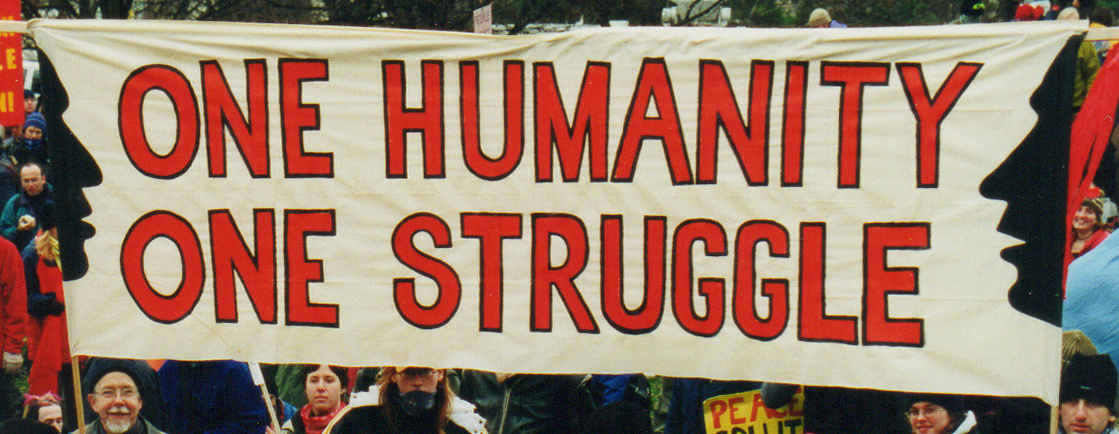
The World
Economic Forum (WEF) is a public/private
partnership of the global ruling oligarchy. An anti-working class club,
it is comprised of many of the global elite financed with expropriated
social wealth workers have produced. The WEF meets in Davos,
Switzerland annually, organizes other events throughout the year and
issues publications and statements. Klaus Schwab is the leader of the
WEF and a protégé of Henry Kissinger, former U.S.
Secretary of State under then President Richard Nixon. A cross-section
of the global oligarchy including billionaires, CEOs and directors of
the world's largest corporations and leaders of imperialist
organizations such as the International Monetary Fund and European
Central Bank hold leadership positions in the WEF. The
WEF Board of Trustees includes two prominent members of Canada's ruling
liberal elite, current Minister of Finance Chrystia Freeland and Mark
Carney, former governor of the Bank of Canada and the Bank of England
and currently a "vice-chairman of Brookfield Asset Management steering
its environmental, social and governance investment strategy fighting
carbon emissions." Carney is also the United Nation's Special Envoy on
Climate Action and Finance. Furthermore, besides being a
member
of the Board of Trustees of the WEF, he, along with 26 others like him,
is now also a "Guardian" of the "Council for Inclusive Capitalism with
the Vatican" formed last December.[1] The cost of
becoming a member of the WEF is tens of thousands of dollars depending
on the "level" of membership. The WEF attempts to
set the agenda and furnish a
reference point for imperialist leaders and others throughout the
world. It engages in battle any public opinion that favours the
international working class setting its own agenda for a new direction
for the economy and tackling how problems facing the world pose
themselves objectively based on its own reference points.
This
year's forum was held virtually because of the pandemic restrictions.
The concern this January was how to deal with the disastrous
consequences of thirty years of neo-liberalism, for which the WEF has
been an avid campaigner. To cope with the global pandemic and an
imperialist economy in crisis in ways that favour the oligarchy, the
WEF is calling for a "Great Reset." The
issue facing the global elite is to "reset" their leadership and
control of the economic, political and social affairs of humanity
without damaging what they call their constitutional order.
This
order enshrines social class positions of privilege and private
ownership of massive social wealth produced by the workers, including
the means of production, and without opening any space for the working
class and its independent organizations to strengthen themselves. For
the ruling elite, the biggest concern is how to block working people
from organizing to empower themselves and gain control over economic,
political and social affairs so that they can effectively deal with the
problems that affect their lives and get on with building societies
that serve them, not the rich. The
existence and prominence of the WEF, the media interest and chatter of
the ruling elite about this private organization and the participation
of many public officials in its activities, including government
leaders, underscore that they consider international civil and
political institutions established in the post Second World War era
such as the United Nations redundant, of no use to them to achieve
their aim. The
content of the 2021 WEF in the midst of a global
pandemic, economic crisis and ongoing imperialist wars is of interest
to the world's peoples only to the extent of knowing what the
imperialists and governments in their service are thinking and
conniving to do. It is deliberate disinformation designed to divert the
peoples from developing their own outlook and independent politics. The
2021 Annual meeting confirms that the ruling elite are concerned for
their own private wealth and class privilege and will do everything in
their power to block the organizing of humanity for its empowerment and
the building of the New. Note 1. According
to its website:
"The Council for Inclusive Capitalism with
the Vatican is a global nonprofit organization established under the
auspices of the Vatican with the moral guidance of Pope Francis. Our
mission is to harness the potential of the private sector to create a
more inclusive, sustainable, and trusted form of capitalism. The
Council is led by a core group of global CEOs and public leaders, known
as the Guardians for Inclusive Capitalism, who convene annually with
the Vatican to advance the Council's mission." List
of Guardians of the "Council for Inclusive Capitalism with the Vatican"
- Ajay Banga, President and Chief Executive
Officer, Mastercard
- Oliver Bäte, Chairman of the
Board of Management, Allianz SE
- Marc Benioff, Chair, Chief
Executive Officer, and Founder, Salesforce
- Edward Breen,
Executive Chairman, Dupont
- Sharan Burrow, General
Secretary, International Trade Union Confederation
- Mark
Carney, COP26 Financial Advisor to the Prime Minister [of Canada] and
United Nations Special Envoy for Climate Action and Finance
-
Carmine Di Sibio, Global Chairman and Chief Executive Officer, EY
- Brunello Cucinelli, Executive Chairman and Creative Director,
Brunello Cucinelli S.p.A.
- Roger Ferguson, President and
Chief Executive Officer, TIAA
- Lady Lynn Forester de
Rothschild, Founder and Managing Partner, Inclusive Capital Partners
- Kenneth Frazier, Chairman of the Board and Chief Executive Officer,
Merck & Co., Inc.
- Fabrizio Freda, President and
Chief Executive Officer, The Estée Lauder Companies
- Marcie Frost, Chief Executive Officer, CalPERS
- Alex
Gorsky, Chairman of the Board and Chief Executive Officer, Johnson
& Johnson
- Angel Gurria, Secretary General,
Organisation for Economic Co-operation and Development
(OECD)
- Alfred Kelly, Chairman and Chief Executive Officer, Visa Inc.
- William Lauder, Executive Chairman, The Estée Lauder
Companies
- Bernard Looney, Chief Executive Officer, BP
- Fiona Ma, Treasurer, State of California
- Hiro Mizuno,
Member of the Board, Principles for Responsible Investment
-
Brian Moynihan, Chairman of the Board and Chief Executive Officer, Bank
of America
- Deanna Mulligan, President and Chief Executive
Officer, Guardian Life Insurance Company of
America
- Ronald P. O'Hanley, President and Chief Executive Officer, State
Street Corporation
- Rajiv Shah, President, The Rockefeller
Foundation
- Tidjane Thiam, Board Member, Kering Group
- Darren Walker, President, Ford Foundation
- Mark
Weinberger, Former Chair and CEO of EY, and Board member of
J&J, MetLife and Saudi Aramco

Ruling elites are trying to make a
silk purse out of a
sow's ear -- it ain't gonna happen. A new direction is necessary
in opposition to imperialism not more of the same in different
garb! The current global arrangement under the
control of the
oligarchy has been variously called "globalization," "one world
government" and a "New World Order." The ruling elite, using
public/private military forces including the massive armed might
and economic pressure from sanctions and blockades of U.S.
imperialism and its allies, have attempted to bring all states
and international institutions under their control and destroy
those they cannot control, like Iraq, Libya and Syria. The
global destruction of sovereign states, international and
local civil societies and even Mother Earth herself has led to a
global pandemic, economic crisis and levels of social and natural
destruction that even many of the rich themselves find alarming,
which has engendered a morbid preoccupation with death and
defeat. They are desperately reshuffling the cards, claiming it
represents a new direction for their economies and countries.
World Economic Forum (WEF) leader Klaus Schwab, in presenting
its 2021 agenda of "stakeholder capitalism," tried to turn the
attention of working people and youth from the real conditions of
life by appealing to them to unite behind identity politics and
those oligarchs cashing in on attempts to deal with the obvious
destruction of Mother Earth. "Stakeholder
capitalism" has found a following among the
global ruling elite including the Rockefeller Foundation and an
organization of Lynn Forester de Rothschild and Pope Francis
called the "Council for Inclusive Capitalism with the Vatican"
formed last December. Its website describes the council as
follows: "The Council for Inclusive Capitalism with
the Vatican is a
historic new partnership between some of the world's largest
investment and business leaders and the Vatican. It signifies the
urgency of joining moral and market imperatives to reform
capitalism into a powerful force for the good of humanity." A
press release from the Council says, "The Council answers
the challenge by Pope Francis to apply principles of morality to
business and investment practices. (Member) organizations commit
to concrete action to create a more equitable, sustainable and
trusted economic system." The release says the
members of the Council, "represent more
than $10.5 trillion in assets under management, companies with
over $2.1 trillion of market capitalization, and 200 million
workers in over 163 countries. The organization challenges
business and investment leaders of all sizes to embrace the
Council's guiding principles and make public commitments to act
on them. These collective actions are intended to lead to
systemic change by making capitalism a greater force for
inclusivity and sustainability." Speaking to the
"Guardians" -- a truly medieval sounding
concept describing the gatekeepers of this private club and its
aims, Pope Francis said, "An economic system that is fair,
trustworthy, and capable of addressing the most profound
challenges facing humanity and our planet is urgently needed. You
have taken up the challenge by seeking ways to make capitalism
become a more inclusive instrument for integral human
wellbeing." "Capitalism has created enormous global
prosperity, but it has
also left too many people behind, led to degradation of our
planet, and is not widely trusted in society," said Lynn Forester
de Rothschild, Founder of the Council and Managing Partner of
Inclusive Capital Partners. "This Council will follow the warning
from Pope Francis to listen to 'the cry of the earth and the cry
of the poor' and answer society's demands for a more equitable
and sustainable model of growth," said the member by marriage of
the ill-gotten gains of the Rothschild banking fortune. This
apparently is the "Great Reset" of "stakeholder capitalism" to save
imperialism. To achieve the Great Reset to
rescue imperialism not only from revolution but from certain
rogue and competing oligarchs, the recently installed U.S. Biden
administration coined the term "Build Back Better" within a
"Green New Deal," which their counterparts in the European Union
call the "European Green Deal." Needless
to say, the "Great Reset" to correct the flaws and failings of
neo-liberalism is organized by the same ruling elites that have
dominated the imperialist world for decades. They have tightened their
grip significantly since the collapse of the Soviet Union and the onset
of this period of retreat of revolution in which the working people do
not have the initiative in their hands. How can they be expected to
solve the problems
they and their system created? The fact remains that imperialism
as the highest and final form of the capitalist system cannot be
reformed or reset to change its stripes and motivation for
maximum profit. It can only remain an exploitative form that
serves the amassing and concentration of private wealth, power
and class privilege through private control, coupon clipping and
outright corruption and theft. It serves the ruling oligarchs and
exploits peoples and nature worldwide, leading to recurring
economic crises, conflict, war and destruction. The
basic contradiction under imperialism between a socialized
economy of industrial mass production and its division into
separate privately-owned parts controlled by competing
imperialists that expropriate the new value workers worldwide
produce must be resolved. A new direction and form must come into
being with relations of production in conformity with the
socialized economy and its modern productive forces that are in
constant change, development and motion and must operate together
in cooperation for mutual benefit, development and the peoples'
well-being. The constant development of the forces
of production such as
the world is witnessing with 5G, smart phones, Internet of
Things, Artificial Intelligence and robotic production require
the constant development and change in the relations of
production. Such is the spontaneous history of human beings and
their forward march to a full life worth living for all, and the
necessity today of conscious history-making by the peoples with
their human factor/social consciousness. 
What to
Expect from a Biden Presidency
I watch
And I ponder The
swearing-in of the 46th president of the United States of America
Taking place in the democratic palace
With soldiers as the
only audience Joe
Biden exclaims:
"America is back"
Promising light
for America
Promising unity and hope
Incarnating
the only solution to the horror With
the same economic policies
With the same imperialist aims
I cannot help but think
That this is the America of before
Which created the worst and fed the horror

June 6, 2020.
Black Lives Matter march in Washington, DC following the
police
killing of George Floyd.
"A cry for racial justice, some
400 years in the making, moves us.
The dream of justice for all will be deferred no longer."
- President Joe Biden,
Inaugural Address, January 20, 2021 What happens
to a dream deferred? In 1951,
the African American poet Langston Hughes wrote a poem by this name
subsequently published in his book titled Harlem. The poem
follows.
Does
it dry up
like a raisin in the sun?
Or fester like
a sore -
And then run?
Does it stink like rotten
meat?
Or crust and sugar over -
like a syrupy sweet?
Maybe
it just sags
like a heavy load. Or
does it explode? "We can deliver racial justice,"
President Joe Biden said in his inaugural address. Certainly one has
cause to wonder how a constitutional order that has repeatedly failed
to provide racial justice and equality for all members of society will
now "deliver racial justice." Biden also refers to
Lincoln and the Civil War saying, "In
another January in Washington, on New Year's Day in 1863, Abraham
Lincoln signed the Emancipation Proclamation. When he put pen to paper,
the president said -- and I quote -- 'If my name ever goes down into
history, it will be for this act, and my whole soul is in it.'
"My whole soul is in it. Today, on this January day, my whole
soul is in this: Bringing America together, uniting our people and
uniting our nation." But Lincoln did not deliver,
in the sense that the 1863 Emancipation Proclamation did not emancipate
the African Americans enslaved -- they together with workers opposed to
slavery did that themselves. As Langston Hughes' colleague W.E.B.
Dubois put it, the Civil War and Reconstruction were a general strike
and an effort by workers, black and white, south and north, to carry
forward the elimination of all enslavement. 
January 19,
2021. Flags are set up in front of the Capitol building replacing
people for the Biden inauguration. Biden
leaves out that the flowering of democracy that took place during
Reconstruction (1865-1877) was brutally crushed by the constitutional
order, as has occurred repeatedly since then, including in efforts this
past summer. Or that Madison, among the "white men of property" who
wrote the Constitution, specifically said it was necessary to design it
so that the majority, also called the "mob" or the "propertyless
majority," could not gain power. Perhaps this is who Biden was
referring to when he said no "riotous mob" could ever "drive us from
this sacred ground... It will never happen. Not today, not tomorrow,
not ever." It is a statement that he and the narrow private interests
he represents will not cede power to the people, which is what history
demands. The poem by Hughes puts forward that a
dream deferred explodes. Perhaps it is this explosion that most worries
Biden. He seems to think the large majority accept the limitation of
dreams and empty promises when they have shown in action that they are
stepping up their organized fight for equality and accountability, as
human beings in the here and now.

-
Kathleen Chandler - 
January 27, 2021. Action
in Washington, DC on the fourth anniversary of the ban by
then-President Trump on foreign nationals from seven predominantly
Muslim countries visiting the U.S.
President Joe
Biden has become the 46th president of the United States at a time of
widespread discontent with government. Resistance and demands for
justice, equality and accountability persist, including in cities like
Seattle, Portland, New York City and Washington, DC. As
President, Biden has a responsibility to preserve the Union, the United
States, as a united whole, while also preserving a constitutional order
that keeps the people out of power. His Inaugural Address and initial
actions are aimed at precisely this. They are addressed to the vying
factions among the rulers whose conflicts remain unresolved through the
means of the election. Impeachment, Congressional gridlock and talk of
having to "fight the enemy within" are indications of the sharp
conflicts within and between the ruling factions. For their part,
working people continue to speak in their own name with slogans such as
"The Vote is Over, the Fight Goes On," banner drops and organized
actions in defence of rights which include the demand for a decisive
say in setting the direction of the economy and the country. 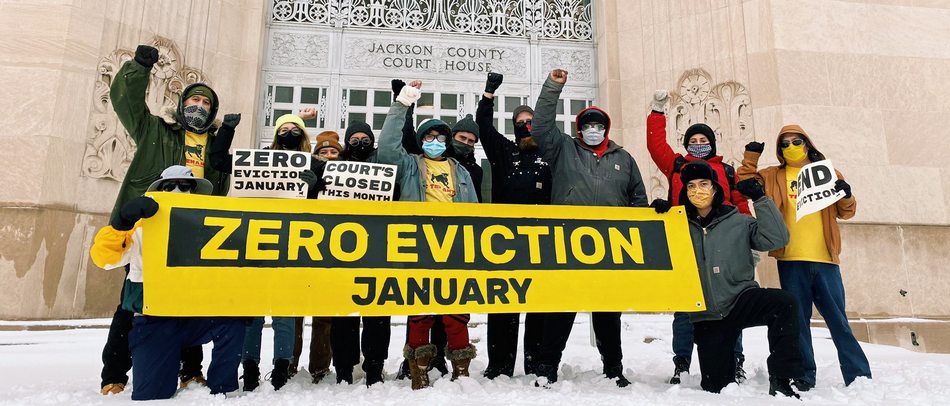
January 2021. Organizing
in Kansas City against evictions.
In his inaugural
address, Biden made repeated reference
to the Civil War. Such references are also repeatedly made by members
of the House of Representatives, such as in their impeachment
documents, by Senator Ted Cruz, and many others. Biden spoke to the
"resilience of the Constitution" and its "we the people who seek a more
perfect union." He appealed to the vying factions to unite: "We can
join forces, stop the shouting and lower the temperature, for without
unity there is no peace, only bitterness and fury... No nation, only a
state of chaos." He repeatedly expressed this demand for unity among
the rulers, going so far as to make it sound like a threat: "Yet hear
me clearly, disagreement must not lead to disunion."
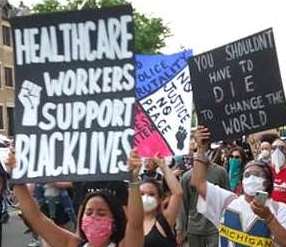 This "disunion"
is not manifested among the people, who across the country have shown
their united stand, such as in the actions in city after city, south
and north, east and west, after the deaths of George Floyd, Breonna
Taylor and others. Disunion is a fear the rulers have that their "more
perfect union" will again end up in violent civil war. It is the morbid
preoccupation they have with defeat and death -- that U.S.-style
democracy will "die on our watch," as Biden put it. And further, that
without that unity among the rulers, today's government of police
powers, with its well-known violence and lawlessness, will be unable to
suppress the determined resistance of the people, over COVID-19
concerns, evictions, unemployment, hunger, education, and more. This "disunion"
is not manifested among the people, who across the country have shown
their united stand, such as in the actions in city after city, south
and north, east and west, after the deaths of George Floyd, Breonna
Taylor and others. Disunion is a fear the rulers have that their "more
perfect union" will again end up in violent civil war. It is the morbid
preoccupation they have with defeat and death -- that U.S.-style
democracy will "die on our watch," as Biden put it. And further, that
without that unity among the rulers, today's government of police
powers, with its well-known violence and lawlessness, will be unable to
suppress the determined resistance of the people, over COVID-19
concerns, evictions, unemployment, hunger, education, and more.
When Biden talks of the "common objects" that "define us
as Americans," he refers not to the demands of the majority for human
rights, equality and peace, but to the old promise of "opportunity,
security, liberty..." This is accompanied by another threat, this time
against the people who are told it is a "duty and responsibility as
citizens, as Americans," to "honour our Constitution and protect our
nation." What then of the striving of the
people for governing arrangements that permit them to exercise control
over policing and budgets, that empower them to speak in their own name
and take the decisions on all the matters that affect their lives? Are
their demands to be considered "extremist" and "unAmerican"? Biden's
initial actions using Executive Orders on
immigration, COVID-19 and the environment are clearly intended to
"lower the temperature" of the resistance and anger which exists from
one end of the United States to the other. These Executive Orders,
along with a $1.9 trillion bill related to COVID-19 and one on
immigration, seek to line up the fighting forces behind him, especially
nurses, teachers and immigrant rights organizers, as well as all those
fighting to make sure Black Lives Matter. All have been organizing
independently and directing their attention to defending rights and
rallying the general public. Biden seeks instead to divert and limit
resistance to supporting his actions. 
January 26, 2021.
Protest by essential workers in New York City.
One
month into his presidency, Biden does not appear to be succeeding.
While some welcome the Executive Orders and legislation as a possible
"start," they also express their lack of confidence that the promises
made will materialize. Nurses and other frontline workers have said
Biden can do far more by invoking the Defense Production Act
to quickly provide all the personal protective equipment (PPE) and
testing materials necessary for the health and safety of all. Immigrant
rights organizers have persisted with their demands for equal rights
and status for all, which Biden's bill does not begin to provide.
Similarly, some unions, rights organizations and youth are organizing
to strengthen resistance together at the local and state levels.
The general sentiment remains that government cannot be
counted on to deliver and that it is the people's forces, that are
decisive in bringing about the change required. Biden's reliance on the
old ways of promising to deliver "racial justice" and end "growing
inequity" by taking a few initial actions will not overcome the broad
lack of confidence in government among the people. "The
Vote is Over, the Fight Goes On."

January 30, 2021. St.
Paul, Minnesota.

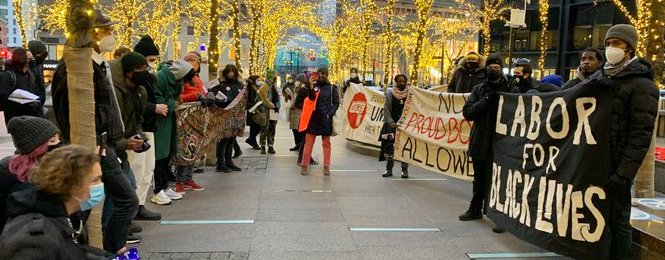
January 20, 2021. New
York City protests on Inauguration Day demand defunding the police,
rent cancellation, and the abolition of Immigration and Customs
Enforcement.
It is evident that President Joe
Biden is having difficulty establishing his authority, especially over
the use of force, in conditions where conflicts continue to manifest
themselves among and between the Executive, the Military and the
States. For example, Texas filed a lawsuit to stop Biden's Executive
Order "pausing" deportations for 100 days. The Texas Governor and
Attorney General are the same ones who had filed a lawsuit that pitted
states against each other as part of the dispute over the election
results. A federal judge in Texas has ruled in favour of the lawsuit
and issued a national mandate to continue deportations. One
of the aims of Biden's Executive Order, in addition to trying to gain
support among activists, is to exercise control over state authorities,
as well as over Immigration and Customs Enforcement (ICE) and Border
Patrol, both known to have backed Trump and carried out his many
illegal and inhumane actions at the border. Texas
also withdrew their National Guard troops from DC, as did New
Hampshire, Florida and Montana. This is a means for them to assert
their authority over those troops, which are a major armed force that
State Governors, not the Presidency, control. The
mobilization, by the Pentagon, of 20,000 National
Guardsmen to turn Washington, DC's Capitol into an armed camp prior to
the inauguration was itself likely a message for Biden,
telling
him to remain loyal to the military. These Guardsmen are federalized by
the president, with the consent of the state governors. While in DC
they are under the command of the Pentagon. About 7,000 National Guards
remained on duty until February 6 and 5,000 of those will remain until
mid-March. In a nod to the military, Biden chose an
Army General,
Lloyd Austin, who commanded troops in the wars against Iraq and
Afghanistan, as his Secretary of Defense. Given he had only been
retired for four years, instead of the legally required seven, he got a
special waiver from Congress to serve in a top civilian post. However,
it is highly unlikely his appointment will assist in uniting the
contending forces within the military and its bureaucracy whose
competition over procurement, deployment and authority are highly
contentious and acrimonious. It is also known that
the FBI asserted its authority, in
relation to the military, by vetting all the troops in DC, removing 12
under suspicion of being "extremists." The FBI is also conducting other
"investigations" along the same lines, including among congresspeople
said to be part of Trump's "insurrection." To its chagrin, in the
course of this process, it was revealed that its own agent is head of
the "Proud Boys" -- known as the racist, Hitlerite group that played a
main role in the January 6 rampage on the Capitol in Washington, DC. Of
most concern however, with FBI moving to more broadly assert its
authority, is whether elected officials, certain military and others,
will be targeted as all contend for power and authority in a
manner not deemed suitable to those who seek to exercise the monopoly
on the use of force, both at home and abroad. It
is a feature of the current situation that the various policing, state,
federal and military authorities are each vying for greater power. Far
from uniting behind Biden and accepting his authority over the monopoly
on the use of force, they are contributing to the "disunion" Biden
fears and speaks of. All of it confirms that the
existing constitutional order and its administrative state cannot solve
the problems of greatest concern to the people, such as equality, the
well-being of the environment, human rights, and war and peace. The old
arrangements based on property concerns cannot meet the modern demand
for equality, which includes a claim to equal political and social
status for all human beings and the recognition of rights by virtue of
being human. The ongoing resistance by the people shows it is their
fight for rights and a modern democracy that empowers the people, that
is unifying and providing a path forward. It is not
fortuitous that the FBI also co-authored the recent Bulletin which
defined "extremists" to be all those who take action "in furtherance of
political and/or social agendas, which are deemed to derive from
anti-government or anti-authority sentiment, including opposition to
perceived economic, social, or racial hierarchies; or perceived
government overreach, negligence, or illegitimacy." The
people's forces organizing resistance to injustice and demanding
equality, an end to police impunity and peace know they are far more
likely to be targets as a result of this definition of an extremist
than are state-inspired and organized far-right groups which,
experience shows, would not even get organized if it wasn't for state
support and backing. Vigilance is
required. 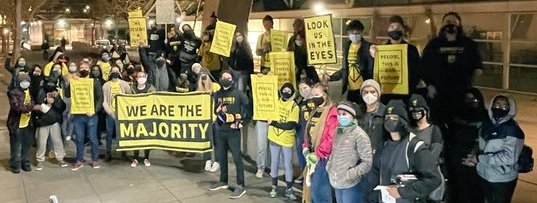
January 20, 2021.
Inauguration Day protest in San Francisco, California.

Food insecurity is a constant feature of U.S. social
conditions. Elevated levels of food insecurity in U.S. households
during the pandemic are an indication of the severity of the current
economic crisis. Food insecurity is one more indication that the
current direction of the U.S. economy under the control of an immensely
wealthy oligarchy cannot solve its problems and provide for the people.
The aim of the global oligarchs for maximum private profit comes into
contradiction with the necessary aim of a modern socialized economy and
country to empower the people so they themselves can solve the problems
that affect their lives and direct the tremendous productive power of
the economy to meet their needs and guarantee their human rights.
The Hamilton Project conducted repeated surveys of families
during 2020 to investigate food insecurity during the pandemic while
also using other resources of the U.S. Census Bureau. Evidence was
found of a relationship between growing food insecurity and income loss
from unemployment or reduction in work hours, and the absence of
nutrition assistance programs. The Project says, "Food insecurity sits
at the intersection of the economy and health." The surveys reveal that
an alarming number of U.S. households "lack sufficient resources to
provide adequate nutrition to its members." The
surveys and reported figures reveal that around 50 per cent of all U.S.
families with school-age children and 44 per cent of families with
below-school-age children have experienced a loss of income during the
pandemic. The loss of income and growing insecurity about the future
have exacerbated the persistent U.S. problem of food insecurity. The
U.S. National Public Radio (NPR) quoted findings from Northwestern
University for 2020 that "food insecurity more than doubled as a result
of the economic crisis brought on by the outbreak." Nearly one in four
households has experienced food insecurity during 2020. The
current U.S. ruling elite, no matter which cartel political party holds
political power locally or nationally, have shown in practice that they
are unwilling to solve the problems of poverty, unemployment, recurring
economic crises and food insecurity. From the point of view of the
people, they have proven themselves "unfit to govern!" The
social, economic and political conditions cry out for a new direction
where an empowered people themselves solve the problems that affect
their lives. No reason or excuse in the world exists that a large
country with extensive agricultural possibilities, a developed economy
of industrial mass production including experienced modern farmers and
workers cannot meet the needs of its people for food and guarantee
their human rights. Discussion and organizing have
begun to bring into being a pro-social direction for the economy and
country with a commitment for democratic renewal to empower the people
to solve the problems that affect their lives, stop paying the rich,
increase investments in social programs, build an anti-war government
and economy, bring U.S. troops and all military equipment home now, and
affirm and guarantee the people's human rights.
The Hamilton Project Surveys The surveys found
10 per cent of parents of children five years old and under report
their kids do not have sufficient food and they lack the resources to
purchase more. For many families with school age children, the problem
of food security is compounded with the cessation of in-school lessons
resulting in the additional loss of school breakfast and lunch programs.
The Project writes, "Food insecurity is a leading indicator of
economic distress; food insecurity tends to rise before poverty rates
catch up. Low-income families with children are most likely to have
experienced an income loss (during 2020) and most likely to have an
income loss coincide with reporting very low food security among the
household's children. "Since
the onset of the COVID-19 pandemic, food insecurity has increased in
the United States. Figure 1 shows that in 2020, food insecurity among
all households and households with children remained elevated over 2019
levels and levels of food insecurity reported during the Great
Recession (2008-09). 
Figure 1 (click to
enlarge)
“Figure
2 shows a spike since March 2020 of parents reporting "their children
aren't getting enough to eat due to a lack of resources" and mothers
specifically who say "that it was sometimes or often the case that 'the
children in my household were not eating enough because we just
couldn't afford enough food'."

Figure 2
(click to enlarge)
The Brookings
Institution "Survey of Mothers with Young Children" shows 12 per cent
of mothers, who only have children five years old and under, reported
that their children did not have enough to eat in April 2020. This
percentage fell to 10 per cent in October and November after the
economy rebounded somewhat and some schools reopened. A
U.S. Census Bureau pulse survey "which has a larger sample size and
surveys both mothers and fathers," found similar results as the above
survey for parents who have children younger than school-age (12 per
cent to 10 per cent food insecurity). However, 17 per cent of parents
with children of all ages reported in June that they and their children
did not have enough to eat. This fell to 12 per cent in a pulse October
survey. The Project says the reports of parents and
children not having enough to eat in 2020 "is quite high by historic
standards." It writes, "A typical feature of recessions is that those
who had fewer means before the downturn suffer more during downturns
and for longer. Indeed, the loss of a job or income, as well as
unstable child care arrangements are associated with the onset of food
insecurity. The downturn instigated by the COVID-19 pandemic is also
likely to increase food insecurity even more: the loss of child care,
as well as meals provided at free or reduced cost at school and social
distancing guidance that restrict movement outside the home. "During
the COVID-19 pandemic, low-income families with children have been the
most likely to have lost earned income during 2020. About 50 per cent
of families with school-age children and 44 per cent of families only
with children who are below school-age reported in October 2020 that
they had experienced a loss of income during the pandemic. Of the
parents reporting that their children do not have sufficient food, 73
per cent of parents of school-age children and 71 per cent of parents
of only younger children also reported experiencing an income loss.
[...] "One-third of households with children with
2019 incomes above $150,000 reported an income loss (in 2020), about 60
per cent of families making below $50,000 in 2019 did. One-third of
households with children making less than $25,000 a year reported very
low food security among children. In addition to the direct
relationship between diminished purchasing power and children having
insufficient food, the loss of prepared school meals, supply chain
issues, and rising food prices make it harder to stretch a dollar."
The Project writes, "There are immediate and long-term health
consequences to inadequate nutrition and limited access to food.
Children born into food insecure households risk birth defects, and
children living in food-insecure households tend to have a lower
health-related quality of life, higher rates of asthma, less nutritious
diets, anemia, and cognitive and behavioural problems that affect
well-being and school performance. "In the first
five years of life -- the foundational years for brain and physical
development -- food insecurity directly and indirectly impedes healthy
development. That parents of children younger than five are reporting
such high rates of very low food security among their children, almost
10 per cent in two surveys fielded in October, is of urgent public
concern. "Deteriorating economic conditions caused
by the COVID-19 pandemic have made it even more difficult for many
low-income households, including those with children, to afford
groceries." In May 2020, The Project conducted a
broad survey of families with children to investigate food insecurity
since the onset of the COVID-19 pandemic. The Project "asked validated
questions taken from the U.S. Department of Agriculture's (USDA) food
security questionnaire. Households and children are considered food
insecure if the respondent indicates the following statements were
often or sometimes true: 'The food we bought just didn't last and we
didn't have enough money to get more. The children in my household were
not eating enough because we just couldn't afford enough food'."
Regarding this and other surveys at the time, The Project
writes, "Figure 1 illustrates the high levels of food insecurity
observed in the COVID Impact Survey and in the Survey of Mothers with
Young Children. By the end of April, more than one in five households
in the United States, and two in five households with mothers with
children 12 and under, were food insecure. In almost one in five
households of mothers with children age 12 and under, the children were
experiencing food insecurity. "Rates of food
insecurity observed in April 2020 are also meaningfully higher than at
any point for which there is comparable data (2001 to 2018; Figure 2).
Looking over time, particularly to the relatively small increase in
child food insecurity during the Great Recession (2008-09), it is clear
that young children are experiencing food insecurity to an extent
unprecedented in modern times. "In the Survey of
Mothers with Young Children, 17.4 per cent of mothers with children
ages 12 and under, reported that since the pandemic started, 'the
children in my household were not eating enough because we just
couldn't afford enough food.' Of those mothers, 3.4 per cent reported
that it was often the case that their children were not eating enough
due to a lack of resources since the coronavirus pandemic began." [...]
"But responses to this question alone do not fully capture
child food insecurity. To estimate food insecurity, the USDA aggregates
a battery of questions on access to food from the Current Population
Survey. In total for 2018, 7.4 per cent of mothers with children under
the age of 12 had food insecure children in their household, more than
double the share who said that the children in their household were not
eating enough because they couldn't afford enough food (3.1 per cent).
If the ratio between this single question and the overall measure of
child food insecurity were to continue to hold today, 17.4 per cent of
children not eating enough would translate into more than a third of
children experiencing food insecurity. "The Survey
of Mothers with Young Children found that 40.9 per cent of mothers with
children ages 12 and under reported household food insecurity since the
onset of the COVID-19 pandemic. This is higher than the rate reported
by all respondents with children under twelve in the COVID Impact
Survey (34.4 per cent) but the same as women 18-59 living with a child
12 and under (39.2 per cent.) "In
2018, 15.1 per cent of mothers with children ages 12 and under
affirmatively answered this question in the FSS [Food Security
Supplement survey], slightly more than the 14.5 per cent that were food
insecure by the complete survey. The share of mothers with children 12
and under reporting that the food that they bought did not last has
increased 170 per cent. "Food insecurity in
households with children under 18 has increased by about 130 per cent
from 2018 to today. Using the COVID Impact Survey, I (Lauren Bauer,
Managing Director of The Hamilton Project) find that 34.5 per cent of
households with a child 18 and under were food insecure as of late
April 2020." [...] "High levels of food insecurity
are not just a problem of households with children. Prior to the
crisis, in 2018, 11.1 per cent of households were food insecure and
12.2 per cent of households answered the single question in the battery
affirmatively. The Urban Institute's Health Reform Monitoring Survey,
in the field from March 25 to April 10, used the six-question short
form food insecurity module and found that 21.9 per cent of households
with nonelderly adults were food insecure. By late April 2020, 22.7 per
cent of households reported in the COVID Impact Survey not having
sufficient resources to buy more food when the food that they purchased
didn't last. Overall rates of household food insecurity have
effectively doubled." [...] "New nationally
representative surveys fielded since the pandemic began show that rates
of food insecurity overall, among households with children, and among
children themselves are higher than they have ever been on record."

Indian
Farmers - Janice Murray - 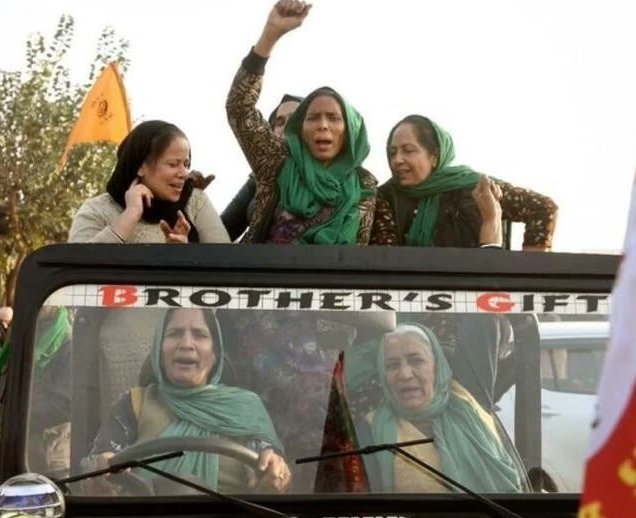
January
18, the 55th day of the farmers' protests at the Delhi border, was
marked as Mahila Kisan Diwas (Women Farmers Day) to honour the
contribution of women in the mobilization to repeal the farm laws. The
day saw broad participation by women in more than 300 districts in
India with large marches and tractor rallies organized, some targeting
members of the central government in their home regions. Women at the
main camp at the Tikri border organized programs to mark the day.
One of the reasons the tribute to the women's role in the
forefront of the protests was organized was in defiance of the
statement made January 11 by Chief Justice of India, S.A. Bobde at a
hearing regarding the farm laws when he asked why women and elders were
being "kept" in the protest, suggesting they should be "persuaded" to
return home, and threatening that the court might pass an order in this
regard. 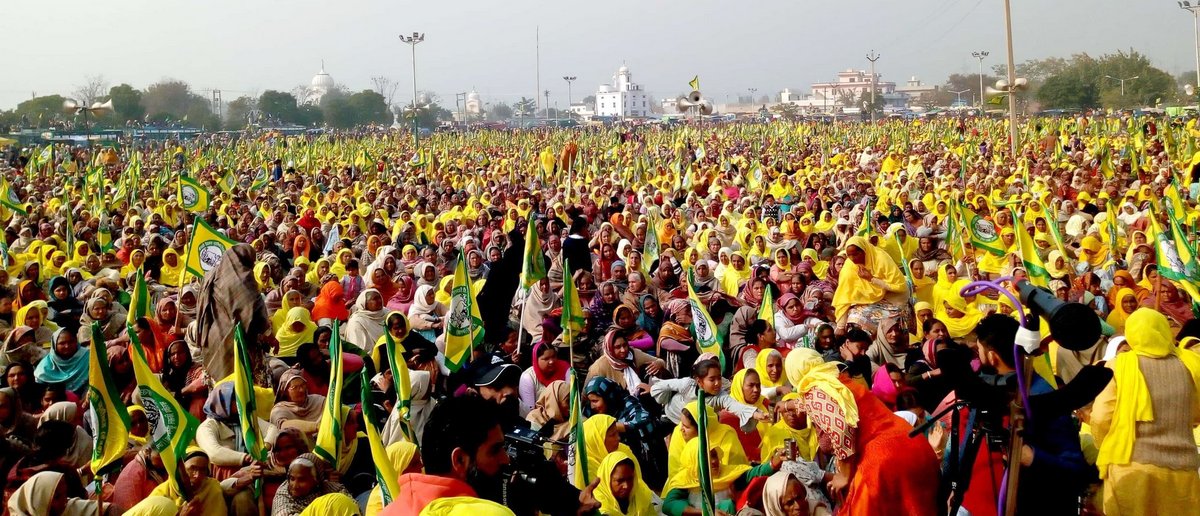
Women have
been very active in the mobilization in their villages against the farm
bills since the summer and while more and more women join the protest
camps at the Tikri and Singhu borders, many others continue to organize
in the local areas as well as run their family farms, while other
family members participate at the Delhi borders. 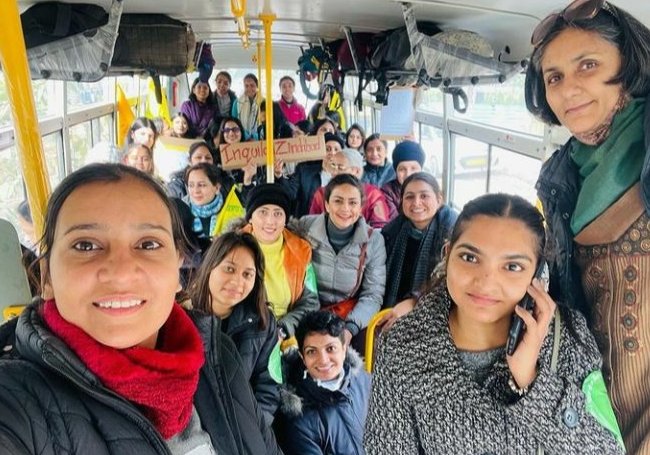 Young women
students, the daughters of farmers, have been joining in creating
awareness using social media and holding discussions in the villages,
encouraging women to join the protests. At Tikri and Singhu borders
they often take the stage to address the protesters. Young women
students, the daughters of farmers, have been joining in creating
awareness using social media and holding discussions in the villages,
encouraging women to join the protests. At Tikri and Singhu borders
they often take the stage to address the protesters.
Older
women have also joined the protests. One woman at a camp on the Delhi
border told reporters, "I have never been in a protest before, but I
would happily die for my land and for my future generation. ... We will
fight for our rights." Women will be particularly
severely affected by the new farm laws. According to a 2018 Oxfam
report, 81 per cent of all economically active women work in the
agriculture industry -- 33 per cent of them as agricultural labourers
while 48 per cent are self-employed farmers. "They remain central to
farming, where they do most of the sowing, transplantation, harvesting,
food processing, and more." Of the rural women involved in
agriculture, the Oxfam report states, only 13 per cent own land.
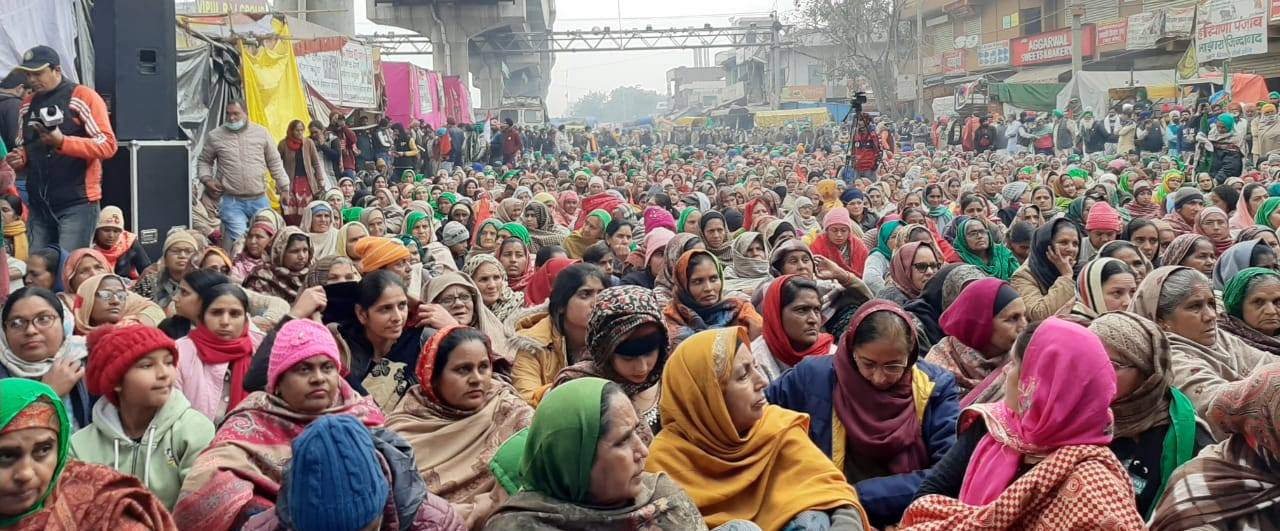
Camp at Singhu Border
crossing, Delhi.
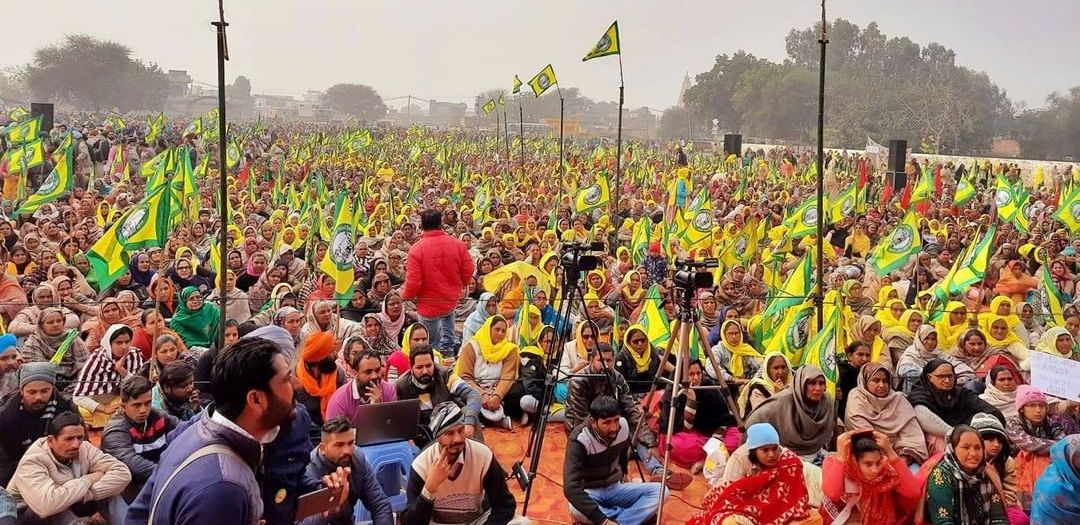
Katehra, Punjab

Visakhapatnam
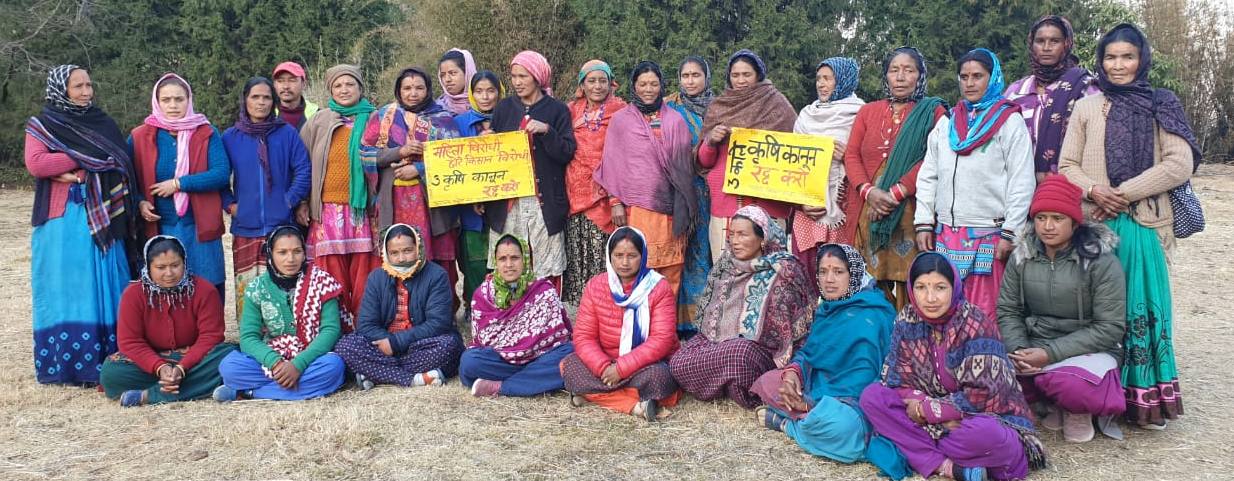
Uttarakhand 
- J. Singh and Meera Kaur - 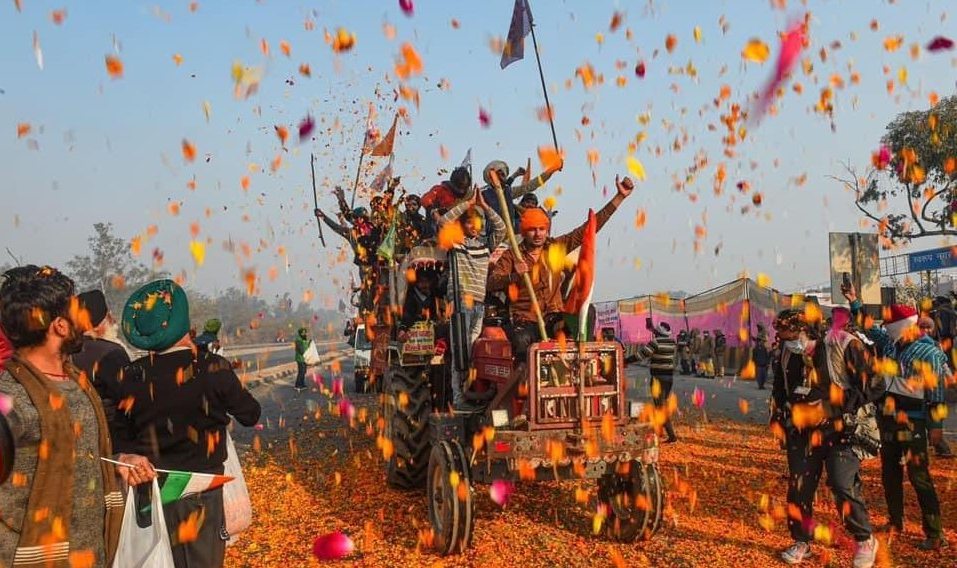
January 26, 2021.
Farmers welcomed by the people of Delhi with a shower of flower petals
as they enter the city for the Republic Day Tractor march.
On January 26, Republic Day in India, the attention of the world was
not on the usual pomp and ceremony at Delhi's Red Fort, but on the
tractor march by hundreds of thousands of farmers on the roads of
Delhi, declaring that they are the Public in the Indian Republic. They
also declared that they are the real patriots because they feed the
whole country. Despite this, representatives of the ruling elite and
their media, keep calling them "anti-national," " terrorists,"
"Maoists," "Khalistanis" and other epithets which they use to justify
treating them as criminals. The tractor march featured floats depicting
the life of farmers and toilers from all over India. "It is definitely
memorable. The farmers and workers are making history," one person said
of it. Thousands of farmers in other capitals and cities throughout
India also held tractor marches and protests for the repeal of the
anti-social farm laws that the central government has brought in.
In Uttar Pradesh, police had issued notices under section 149
-- a colonial provision -- to farmers who owned tractors, to not take
their tractors on the road from January 23 to 26 in order to "safeguard
children on the road." But the farmers in their thousands defied these
notices and went to Delhi. The government had also ordered the diesel
dealers to not sell diesel to the farmers. The farmers responded by
setting up their own diesel supplies. Rallies, demonstrations and
protests took place all over the world in front of Indian missions in
support of the farmers and their just demands. Every
attempt is being made to discredit the farmers. At the tractor march on
Republic Day the police staged a provocation with what appeared to be a
small group of farmers who left the main march, breaking through
barricades and reaching the Red Fort where they hoisted the flag of the
farmers and the Sikh gurus. Not surprisingly, the government
immediately seized on the incident as a pretext to unleash further
police measures on the farmers and their supporters. Leaders of the
farmers condemned the action saying it was led by agents provocateurs
closely connected to the governing party, the BJP. One of them was seen
in a photo op with Prime Minister Modi. It is also reported that a
farmer was shot dead by the police. There are reports of some policemen
also getting injured in clashes at the Red Fort. The corporate media
screamed overtime to demonize the farmers' march using the few
scattered incidents to detract attention from the justice of the
farmers' cause and the millions upon millions who espouse it.
To stop the farmers from gathering in Delhi, trains headed
there have been either short stopped or diverted, citing operational
pretexts. Cement walls and cement barricades have been built on orders
of the central government. The latest measure of the central government
is to order the Delhi police and government to prevent the supply of
water, food, sanitation and essential items sent by people of nearby
states from reaching the farmers who are in the midst of this heroic
unprecedented protest. The farmers responded that these illegal
measures would not deter them from achieving the repeal of the
anti-social neo-liberal farm laws. Farmers also
marched on foot to the Lok Sabha, the parliament, during the budget
session that got underway on January 29. Farmers' unions announced a
countrywide 'Chakka Jam' to be held February 6 to block
national and state highways for three hours in protest against the
internet ban in areas near their agitation sites, harassment by
authorities, and other issues. At the Ghazipur
border, Bharatiya Kisan Union (BKU) leader Rakesh Tikait said the
police barricading could not stop the farmers and they were ready to
continue their protests as long as needed. "Talks with the government
will continue, this taarbandi (barricading) will
also continue. We have been told that no one will be able to leap over
these barriers. This movement is of the poor. The king is fortifying
this place, but we are prepared till October-November. This protest
will not end any time soon," Tikait said. "Repealing the laws is the
only way out." The Samkyukt Kisan Morcha (SKM), an
umbrella body of protesting unions, informed that the Twitter accounts
of Kisan Ekta Morcha and a user named 'Tractor2Twitter' have been
restricted. Swaraj Abhiyan leader Yogendra Yadav said the action
against the Twitter account was taken on the "request of government
authorities." He also decried that the government's Union Budget 2021,
reduces the allocation to the agriculture sector.
In a statement, the SKM said, "Increased barricading including
trench-digging, fixing nails on the roads, barbed wire fencing, closing
off of even internal roads, stopping internet services, orchestrating
protests and facilitating the same through BJP-RSS [Bharatiya Janata
Party -- Rashtriya Swayannsevak Sangh] workers, diversion of trains and
stopping them before destination stations are all part of multiple
attacks being organized by the government, its police and
administration against the protesting farmers."
"On one hand, the Prime Minister says that the solution is only one
call away, but on the other hand the government is doing its best to
block off the protest sites, cut off facilities and inconvenience the
public," the statement said.
At the Singhu border, farmer leaders demanded the release of the 122
people arrested by the Delhi Police, blaming them for violence in
connection with Republic Day events. SKM's Darshan Pal said: "The Delhi
Police have released the list of 122 agitators (activists) who were
taken into police custody. We demand their immediate release. We also
condemn the attacks on and arrests of journalists who are covering the
movement." Questioning the police tactics, Pal said, "To ensure that
more people do not join (the protests), to cut off the coordinated
functioning of the Morcha, to project images of violence so that
ordinary people stay away, and to crack down on protesters through
fabricated charges and arrests, while the real criminal elements go
scot-free without any arrests and concrete police action so far,
reveals the fact that the government is very scared of the increasing
support for the movement." Organizers are concerned that many
people at the protest sites had gone "missing," he added. Balbir
Singh Rajewal, a farmer leader from Punjab, and part of the SKM, told
reporters that the modalities of the February 6 'Chakka Jam' were to be
decided after discussion with various unions collectively, including
those protesting at Ghazipur border site, the new focal point of the
farmers movement against the new farm laws. Rajewal claimed
during
the press conference that scores of people have been "detained by the
police" and First Information Reports (FIRs) have been filed
against many, including a journalist. "Our February 6 protest would
also be against this harassment faced by journalists who are trying to
report the truth from the ground, and the Twitter restrictions," he
said. Thus far, the farmers are developing many
other forms of protest to show they are undeterred. They stand united
in their demand for the repeal of the farm laws: the Farmers' Produce Trade and
Commerce (Promotion and Facilitation) Act, 2020; Farmers (Empowerment
and Protection) Agreement on Price Assurance and Farm Services Act, 2020;
and the Essential
Commodities (Amendment) Act, 2020. An
Explosion of Songs, Poems, Plays,
Paintings and Other Art
Forms 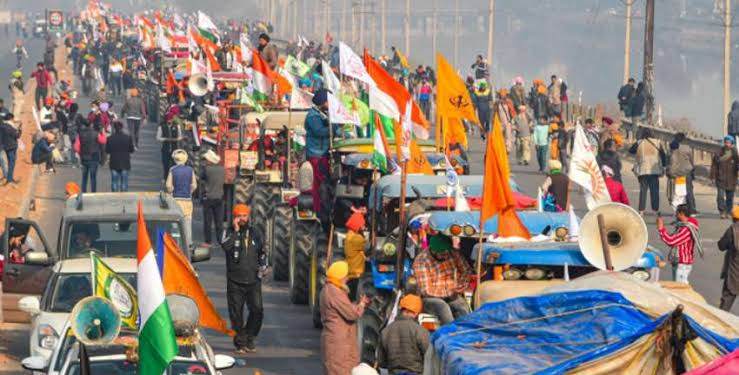
Another
prominent feature of the historic protest is the explosion of songs,
poems, plays, paintings and other arts inspired by the farmers movement
all across India and both East and West Punjab. Many of them talk about
Sidak --
Fidelity to the cause; Sabar
-- Discipline, Patience and Ekta
-- Unity. One of the songs that has become very popular is: Asin
Padhange Kisan Mazdoor Ekta
Tera Honna Chhutkara Zindabad
Bolke
(We uphold the unity of farmers and workers
You can only save yourself by shouting Long Live!)
Asin
Izaatan De Rakhayan Di Qom Hakima
Tainun Sharam Na Ayee
Atwadi Bolke
(We are defenders of dignity
Listen you rulers -- You have no shame in calling us extremists)
Zindabad,
Zindabad,Zindabad
Tainun Dilliye Ekath Eh Preshan Karuga
Faslan De Faisle Kisan Karuga
(Listen Delhi! Our
unity is trouble for you
The Farmer will decide about his
crops) A seven-year-old boy sang it on the stage
with great flair and passion and thousands of men and women joined him
with both their arms up in the air shouting Zindabad,
Zindabad, Zindabad. (Long Live, Long Live, Long Live).
Another song declares: Sade
Layi Kile Ban gayian ,Sadkan Ne Patshah
Barse Koi Noor Ilahi
Dilli De border Te
Ose Hi Rah Te Tur Paye Put Tegh Bahadur De
Barse Koi Noor Ilahi Dilli De Border Te
(For us the
roads and highways have become forts
A divine light shines at
our encampment at the border of Delhi
Sons of Tegh Bahadur
are marching on the same path) The song invokes
memories of Guru Tegh Bahadur, Guru Gobind Singh, his four sons and
mother who became martyrs while fighting tyranny. Hundreds of songs,
poems and plays are depicting the struggles of farmers and all toilers.
Many of them are invoking the struggle against the British. Punjabi
songs and poems are evoking memories of the centuries-long fight of
Punjab against Delhi.
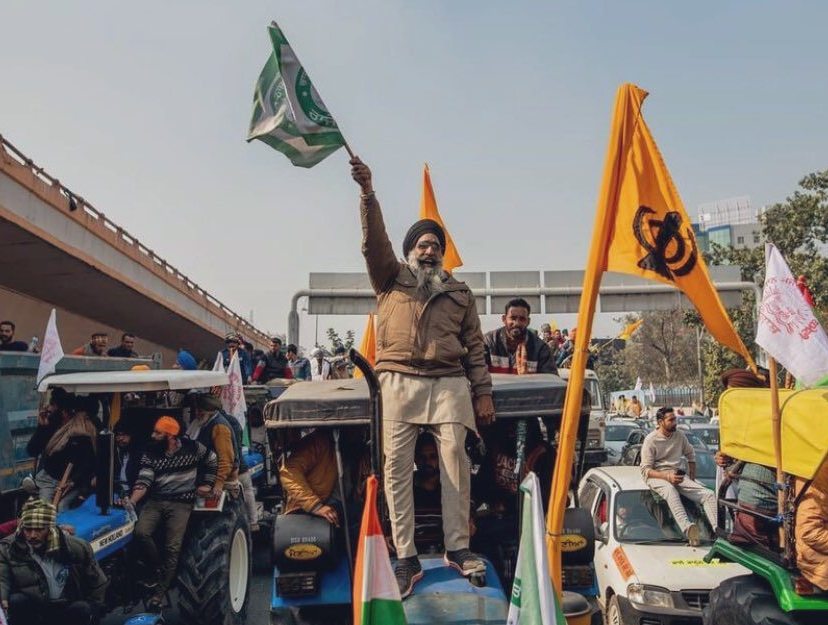 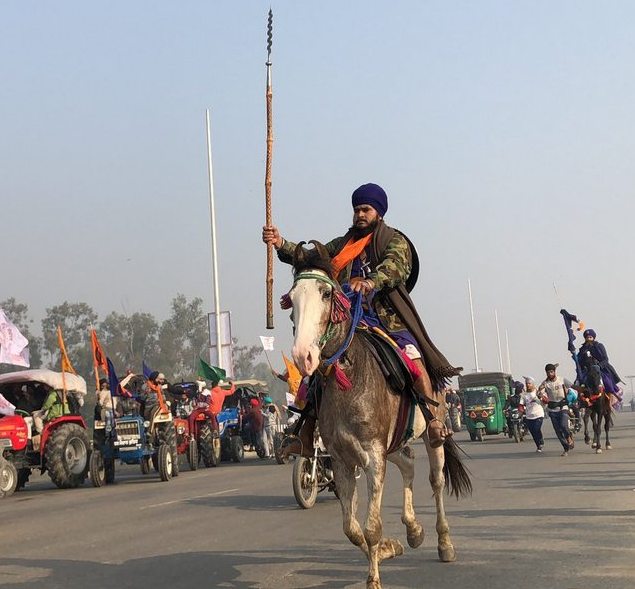
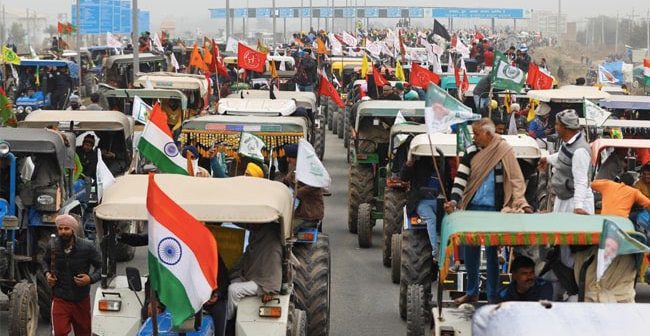
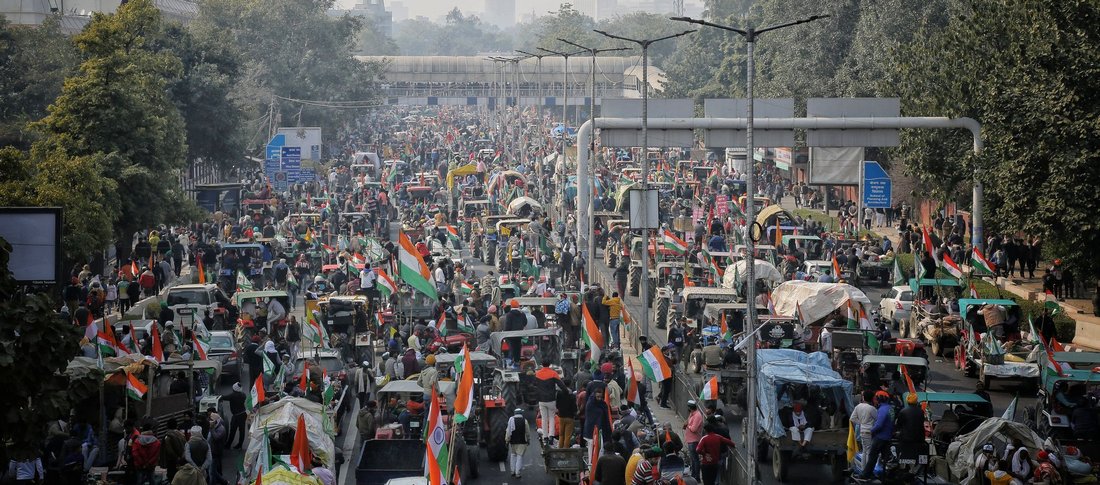
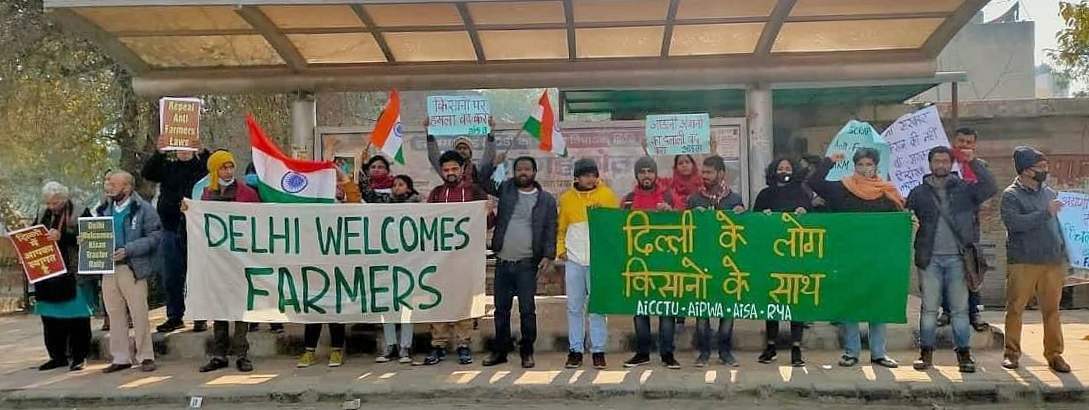


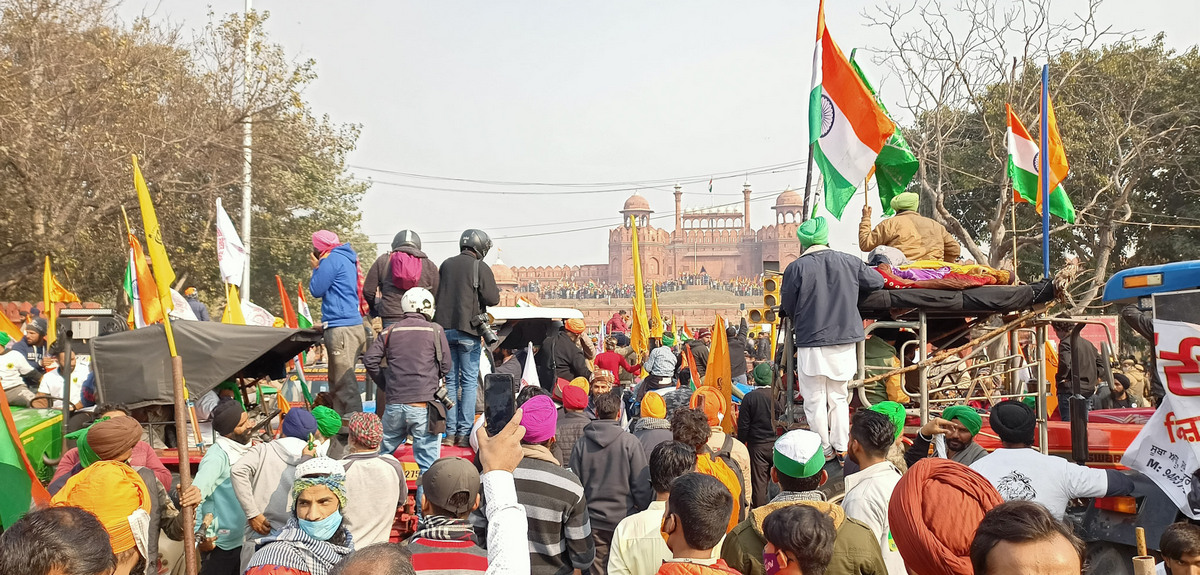

-
National Farmers Union - This
statement by the National Farmers Union and their Backgrounder were
issued in early December 2020. 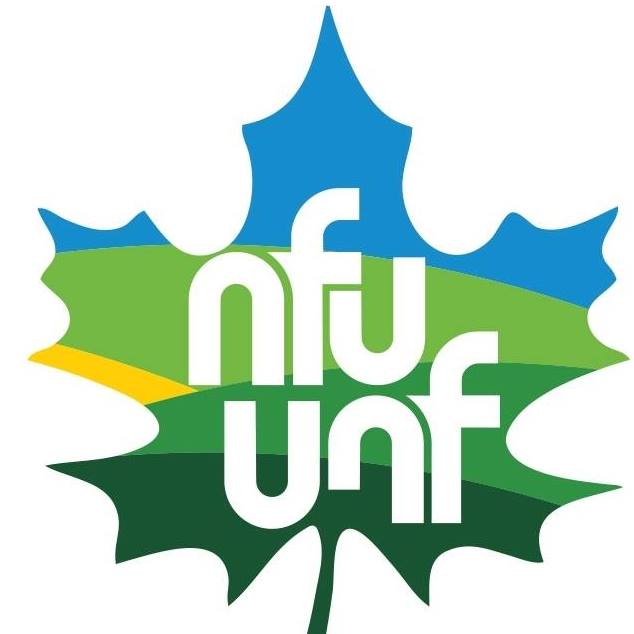 The National
Farmers Union stands in solidarity with farmers in India, who continue
to protest new agricultural laws formally passed in September. This
agriculture reform will effectively undermine the guaranteed prices
farmers receive through government purchase of staple crops and open
them up to exploitation by large corporations. Tens of thousands of
Indian farmers are protesting, demanding that these reforms be
rescinded or that a new law be introduced to guarantee them a minimum
price for their crops. "We in Canada recognize the Indian farmers'
struggle as similar to our own struggle. We support them in their right
to protest, and in their call for agriculture policy that supports the
millions of smallholder farmers growing food in India," said NFU
President Katie Ward. The National
Farmers Union stands in solidarity with farmers in India, who continue
to protest new agricultural laws formally passed in September. This
agriculture reform will effectively undermine the guaranteed prices
farmers receive through government purchase of staple crops and open
them up to exploitation by large corporations. Tens of thousands of
Indian farmers are protesting, demanding that these reforms be
rescinded or that a new law be introduced to guarantee them a minimum
price for their crops. "We in Canada recognize the Indian farmers'
struggle as similar to our own struggle. We support them in their right
to protest, and in their call for agriculture policy that supports the
millions of smallholder farmers growing food in India," said NFU
President Katie Ward.
As shrinking net farm incomes
reach a crisis level for farmers around the world and also in Canada,
Canadian farmers understand the need for government regulation that
works for farmers rather than for those who take profits at the expense
of farmers. "We have experienced the dismantling of institutions that
were vital to the bargaining power and, by extension, incomes of
Canadian farmers," said NFU Vice-President Stewart Wells, "For example
the loss of the single desk marketing system for hogs in the 1990s and
more recently the destruction of the Canadian Wheat Board, among
others." As a result of losing the single-desk
marketing system for hogs, thousands of Canadian farmers could no
longer raise hogs because they could not access the market without a
contract. The intentional shift to corporate hog production has left
that sector fully vertically integrated and dominated by only three
meat processing corporations. Prices are regularly below the cost of
the production. The industry is heavily dependent on government safety
nets to ride out the highly volatile market. It is an industry now
largely devoid of family farmers. The change in hog farming in Canada
was swift and brutal for family farmers raising hogs -- a direct result
of agriculture policy aimed at assisting corporations instead of
farmers. While the circumstances of Indian farmers
are vastly different than Canadian farmers in many ways, it is clear
that agricultural policies that serve to undercut farmers' livelihoods
to make room for large corporations to profit will have devastating
consequences for the millions of smallholder farmers and their families.
India's food security is threatened, as the new laws will
shift its agricultural economy from "food production" for people to
"commodity production" for trade and export. Farmers take on more debt
and risk in a system of contract farming. The new laws will lift the
ban on hoarding food by corporate buyers, which will allow them to
capitalize on ups and downs in production by price-gouging consumers
during shortages and depressing prices to farmers in times of abundance.
"Farmers did not ask for this reform, and it is not in their
interest. The impacts will be devastating and far-reaching. Canada's
NFU supports Indian farmers in their opposition to these reforms," Ward
stated, "We object to the suppression of democratic protest taking
place in India this week. We stand with Indian farmers, and their right
to protect their livelihoods by protesting the imposition of these
unjust laws." 
- NFU
Backgrounder - India has 164 million farmers, and
many have small farms where they grow food to feed themselves and sell
locally to feed their communities. Over half of India's workforce is
involved in the agriculture sector. Hundreds of thousands of farmers
are protesting impending changes that will result from three
controversial laws. Farm leaders have been in talks with government,
demanding that these laws be repealed. Tens of thousands of farmers are
in New Delhi itself, and more camped out around the city, blocking
entrances. Protests are occurring all across India, with the support of
non-farmers in other sectors such as transport. On December 8, the
farmers called for a peaceful national general strike in support of
their demands. New Laws Passed in September Set
to Go into Effect in December In June 2020 the
Indian Cabinet put forward three controversial agriculture reform bills
in conjunction with its suite of COVID 19 measures. In September, these
bills -- The Farmers
(Empowerment & Protection) Agreement of Price Assurance and
Farm Services Bill, The
Essential Commodities Act (Amendment) Bill and Farmers' Produce Trade and
Commerce (Promotion and Facilitation) Bill -- were passed
by the Indian Parliament in a rushed process, without allowing for
extended debate or careful examination by a committee. The final vote
was conducted by voice rather than ballot, making it impossible to have
a clear count of the votes. The bills will become law once they are
approved by President Ram Nath Kovind.... The
Bills The Farmers (Empowerment &
Protection) Agreement of Price Assurance and Farm Services Bill
-- This bill allows for direct contracting between farmers and buyers
prior to sowing, but does not require these contracts to be in writing,
does not penalize companies that fail to register their contracts, and
does not set a minimum price. The farmers can thus be left with no
recourse if terms of the contracts are not fulfilled. The
Essential Commodities
Act (Amendment) Bill -- This bill removes all limits that
have, until now, prevented companies from hoarding basic food items
including cereals, pulses, oilseeds, edible oils, onions, and potatoes,
even in the event of war, famine or natural disaster. This change was
made at the request of food processing and food exporting corporations.
Farmers'
Produce Trade and Commerce (Promotion and Facilitation) Bill
-- This bill deregulates trade by allowing farmers to sell outside of
their own state's Agricultural Produce and Livestock Market Committee
(APMC) markets, and prevents states from collecting fees from the
markets to fund their operation. This will allow corporations to set up
their own, unregulated markets. Implications for
Farmers Direct contracting increases the power
of buyers. To reduce costs of obtaining supplies, companies will
purchase from the largest farms and/or look for the lowest prices. This
will lead to small farms no longer having access to any market. As
small farmers are forced out, land holdings will become larger and more
concentrated. Vertical integration of farms with processing companies
will accelerate this process, as risks and debts are offloaded onto the
least powerful in the value chain. As small farmers
lose their land or are no longer able to survive on lower, deregulated
prices they will be forced to leave villages and move to cities, where
employment is uncertain. Small farmers produce food for themselves and
communities. By shifting from public markets to corporate buyers who
operate nationally, food will move to larger markets. There will be
less food available locally and it will be more expensive. Allowing
corporations to hoard food empowers them to buy up supplies at low
prices when there is a good harvest. It shifts the public "strategic
reserve" meant to buffer volatility and prevent hardship and instead
creates private control of the food supply. Companies will be allowed
to export hoarded food, even in the event of natural disaster, war or
famine in India. The new laws create a positive
environment for consolidation of farmland, concentration of ownership
in agricultural companies, greater control of markets and prices by
large processors, retailers and exporters, and increased sales of
commercial seed, chemical inputs such as fertilizer, herbicides and
pesticides, and digital technology for data mining, surveillance and
automation. Which Powerful Corporations Stand to
Gain? Some of the same multinational food,
agribusiness and technology companies active in Canada are also active
in India: including Bayer, BASF, Dow Dupont, Nestle, Coca Cola, Pepsi,
Amazon, IBM and Microsoft. Some of the large agribusiness corporations
are also Indian, such as Tata, Bharat Group, Atul, and Nuziveedu Seeds.
Why Does This Matter to Canadians? If
allowed to go into effect, these laws will increase the power of the
world's largest agribusiness corporations. It will embolden them to
demand similar changes in other countries. The ability of large
corporations to force down prices to Indian farmers and to demand
adherence to corporate priorities as a condition of making a living
will affect farmers around the world. As Canadians
and fellow farmers we recognize the harm that the Indian laws will do
to Indian farmers and their families. We want to live in a world where
human lives are respected, where people can democratically shape their
future together, carry forward their food cultures intact, and have
hope that our children will be able to live well as farmers if and when
they choose to. We are stronger when we act
together, whether it is by marketing our products or standing up for
our rights. 
(To
access articles individually click on the black headline.) PDF
PREVIOUS
ISSUES | HOME
Website: www.cpcml.ca
Email: editor@cpcml.ca | 

 Should
extremist, racist, homophobic, misogynist acts be prosecuted and
punished? Absolutely! But who is designating organizations "terrorist"
and by what process are they being outlawed? And on the basis of what
criteria? That is the issue, not whether they should be prosecuted if
they engage in criminal acts. It is beyond absurd to suggest that rule
of law is strengthened by use of police powers over which the people do
not exercise control. To suggest that the police powers which rule the
civil power have the consent of the governed is a travesty. It defies
logic and common sense. In Canada, the civil power is itself the
expression at any time and in various forms of racist, homophobic,
misogynist, anti-communist, anti-worker and terrorist values.
Should
extremist, racist, homophobic, misogynist acts be prosecuted and
punished? Absolutely! But who is designating organizations "terrorist"
and by what process are they being outlawed? And on the basis of what
criteria? That is the issue, not whether they should be prosecuted if
they engage in criminal acts. It is beyond absurd to suggest that rule
of law is strengthened by use of police powers over which the people do
not exercise control. To suggest that the police powers which rule the
civil power have the consent of the governed is a travesty. It defies
logic and common sense. In Canada, the civil power is itself the
expression at any time and in various forms of racist, homophobic,
misogynist, anti-communist, anti-worker and terrorist values.  All of it is used
to make sure no discussion takes place within the polity on what it
means to defend freedom of speech and conscience while not permitting
acts of violence against the people. The cartel parties which are
crowing that they are the champions of rights should be seriously put
in their place. Which people of colour in Canada, Indigenous persons,
or persons of various faiths can say they feel safer when under "police
protection?" Victims of hate and terrorist acts are supposed to accept
a "trade-off" between security and rights. It is irrational.
All of it is used
to make sure no discussion takes place within the polity on what it
means to defend freedom of speech and conscience while not permitting
acts of violence against the people. The cartel parties which are
crowing that they are the champions of rights should be seriously put
in their place. Which people of colour in Canada, Indigenous persons,
or persons of various faiths can say they feel safer when under "police
protection?" Victims of hate and terrorist acts are supposed to accept
a "trade-off" between security and rights. It is irrational.

 The U.S. had
tried, but failed as well, to get the Organization of American States
(OAS) to adopt this position at a special meeting of the organization
held in December right after the new National Assembly was elected.
With Canada's help, the U.S. was able to corral enough countries to get
an interfering resolution passed that called on the international
community to "join in the rejection of these fraudulent elections" and
demanded the holding of new legislative and presidential elections as
soon as possible. But it did not call for continuing to recognize the
outgoing National Assembly instead of the newly elected one, and had no
mention of recognizing Guaidó as interim president.
The U.S. had
tried, but failed as well, to get the Organization of American States
(OAS) to adopt this position at a special meeting of the organization
held in December right after the new National Assembly was elected.
With Canada's help, the U.S. was able to corral enough countries to get
an interfering resolution passed that called on the international
community to "join in the rejection of these fraudulent elections" and
demanded the holding of new legislative and presidential elections as
soon as possible. But it did not call for continuing to recognize the
outgoing National Assembly instead of the newly elected one, and had no
mention of recognizing Guaidó as interim president.  "The refusal of
the ruling elite to organize universal free childcare and early
learning for all children is a block to the economy meeting its
potential.
"The refusal of
the ruling elite to organize universal free childcare and early
learning for all children is a block to the economy meeting its
potential. "The worry is,
since then we've had wider shutdowns in Ontario and more shutdowns in
other provinces, and I think we'd be extremely lucky if we don't see an
even bigger decline a month from now," Porter said. "I think we all
have to realize that there is a very heavy price to be paid in terms of
people's livelihoods when we start calling for big new restrictions on
businesses... There is a trade-off here -- we [the banks] get accused
of putting profits ahead of people, and I don't see it that way. I
think it's livelihoods and not profits, but I see it day-by-day, calls
for even more intense restrictions, and I wonder if it's really
achieving what people think it's achieving. It's definitely coming at
an economic cost," Porter said.
"The worry is,
since then we've had wider shutdowns in Ontario and more shutdowns in
other provinces, and I think we'd be extremely lucky if we don't see an
even bigger decline a month from now," Porter said. "I think we all
have to realize that there is a very heavy price to be paid in terms of
people's livelihoods when we start calling for big new restrictions on
businesses... There is a trade-off here -- we [the banks] get accused
of putting profits ahead of people, and I don't see it that way. I
think it's livelihoods and not profits, but I see it day-by-day, calls
for even more intense restrictions, and I wonder if it's really
achieving what people think it's achieving. It's definitely coming at
an economic cost," Porter said. Historically, one
of the aims of the assessment of unemployment based on participation in
the labour market has been to ensure that Employment Insurance
(formerly Unemployment Insurance) is not a social program that protects
all those who find themselves unemployed in an economic system in which
everything is subordinated to narrow private interests. A lower
official rate of unemployment means that workers have to work more
hours before becoming eligible and the duration of their benefits is
shorter. This along with all the other criteria for eligibility adopted
over the years which have led to a situation in which it is assessed
that only about 40 per cent of the unemployed receive EI benefits. An
exception made by the federal government since the end of September
2020, which will last until September 11 this year, assumes a minimum
unemployment rate of 13.1 per cent is being applied in all EI economic
regions across Canada. This was not done to provide justice to the
unemployed but to maintain a certain amount of money in circulation in
the economy so as to prevent further economic collapse.
Historically, one
of the aims of the assessment of unemployment based on participation in
the labour market has been to ensure that Employment Insurance
(formerly Unemployment Insurance) is not a social program that protects
all those who find themselves unemployed in an economic system in which
everything is subordinated to narrow private interests. A lower
official rate of unemployment means that workers have to work more
hours before becoming eligible and the duration of their benefits is
shorter. This along with all the other criteria for eligibility adopted
over the years which have led to a situation in which it is assessed
that only about 40 per cent of the unemployed receive EI benefits. An
exception made by the federal government since the end of September
2020, which will last until September 11 this year, assumes a minimum
unemployment rate of 13.1 per cent is being applied in all EI economic
regions across Canada. This was not done to provide justice to the
unemployed but to maintain a certain amount of money in circulation in
the economy so as to prevent further economic collapse.




 This "disunion"
is not manifested among the people, who across the country have shown
their united stand, such as in the actions in city after city, south
and north, east and west, after the deaths of George Floyd, Breonna
Taylor and others. Disunion is a fear the rulers have that their "more
perfect union" will again end up in violent civil war. It is the morbid
preoccupation they have with defeat and death -- that U.S.-style
democracy will "die on our watch," as Biden put it. And further, that
without that unity among the rulers, today's government of police
powers, with its well-known violence and lawlessness, will be unable to
suppress the determined resistance of the people, over COVID-19
concerns, evictions, unemployment, hunger, education, and more.
This "disunion"
is not manifested among the people, who across the country have shown
their united stand, such as in the actions in city after city, south
and north, east and west, after the deaths of George Floyd, Breonna
Taylor and others. Disunion is a fear the rulers have that their "more
perfect union" will again end up in violent civil war. It is the morbid
preoccupation they have with defeat and death -- that U.S.-style
democracy will "die on our watch," as Biden put it. And further, that
without that unity among the rulers, today's government of police
powers, with its well-known violence and lawlessness, will be unable to
suppress the determined resistance of the people, over COVID-19
concerns, evictions, unemployment, hunger, education, and more.







 Young women
students, the daughters of farmers, have been joining in creating
awareness using social media and holding discussions in the villages,
encouraging women to join the protests. At Tikri and Singhu borders
they often take the stage to address the protesters.
Young women
students, the daughters of farmers, have been joining in creating
awareness using social media and holding discussions in the villages,
encouraging women to join the protests. At Tikri and Singhu borders
they often take the stage to address the protesters.













 The National
Farmers Union stands in solidarity with farmers in India, who continue
to protest new agricultural laws formally passed in September. This
agriculture reform will effectively undermine the guaranteed prices
farmers receive through government purchase of staple crops and open
them up to exploitation by large corporations. Tens of thousands of
Indian farmers are protesting, demanding that these reforms be
rescinded or that a new law be introduced to guarantee them a minimum
price for their crops. "We in Canada recognize the Indian farmers'
struggle as similar to our own struggle. We support them in their right
to protest, and in their call for agriculture policy that supports the
millions of smallholder farmers growing food in India," said NFU
President Katie Ward.
The National
Farmers Union stands in solidarity with farmers in India, who continue
to protest new agricultural laws formally passed in September. This
agriculture reform will effectively undermine the guaranteed prices
farmers receive through government purchase of staple crops and open
them up to exploitation by large corporations. Tens of thousands of
Indian farmers are protesting, demanding that these reforms be
rescinded or that a new law be introduced to guarantee them a minimum
price for their crops. "We in Canada recognize the Indian farmers'
struggle as similar to our own struggle. We support them in their right
to protest, and in their call for agriculture policy that supports the
millions of smallholder farmers growing food in India," said NFU
President Katie Ward.